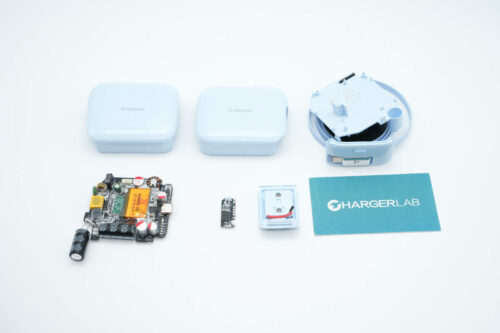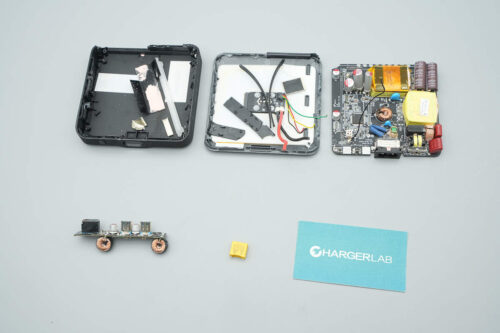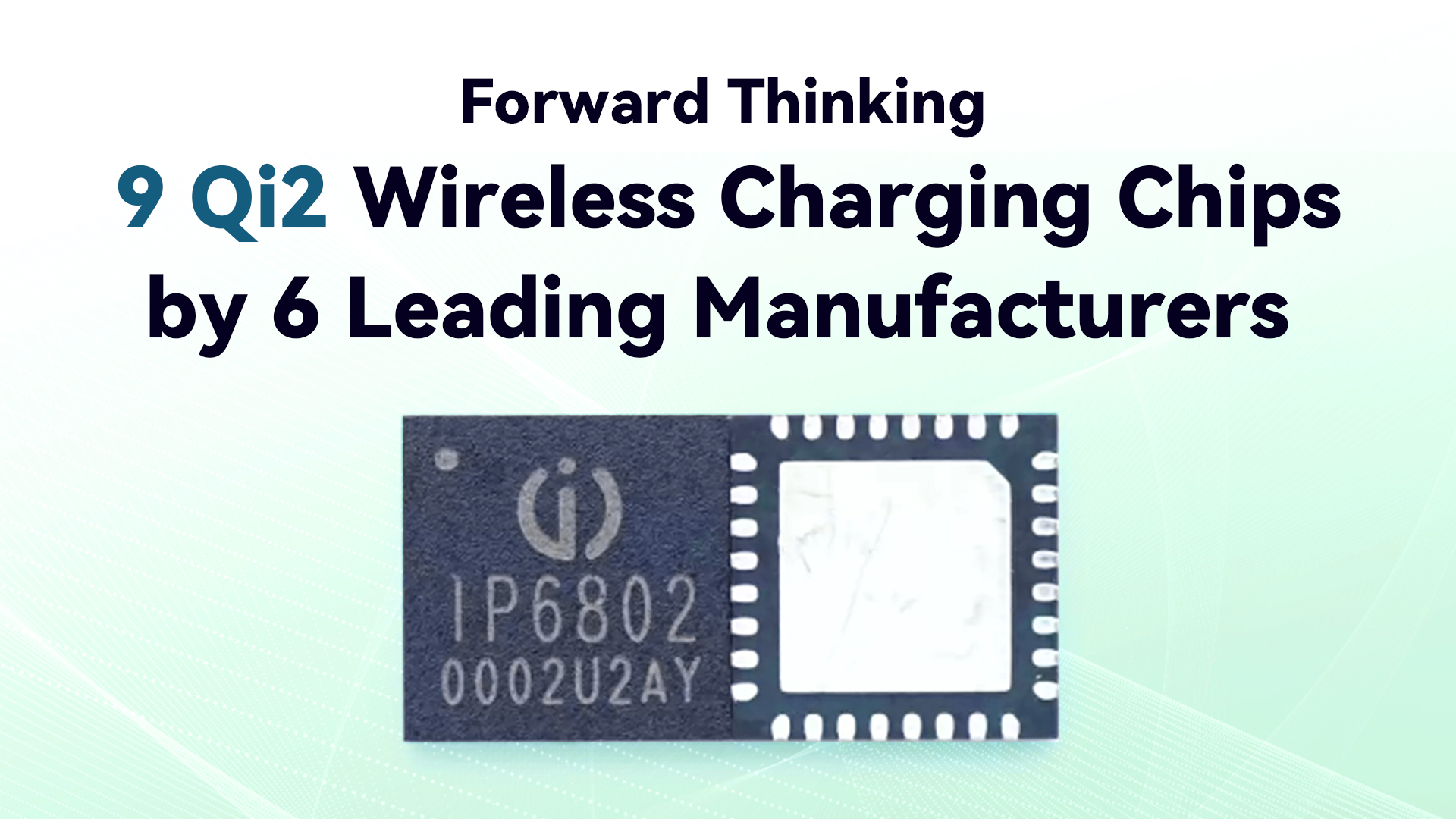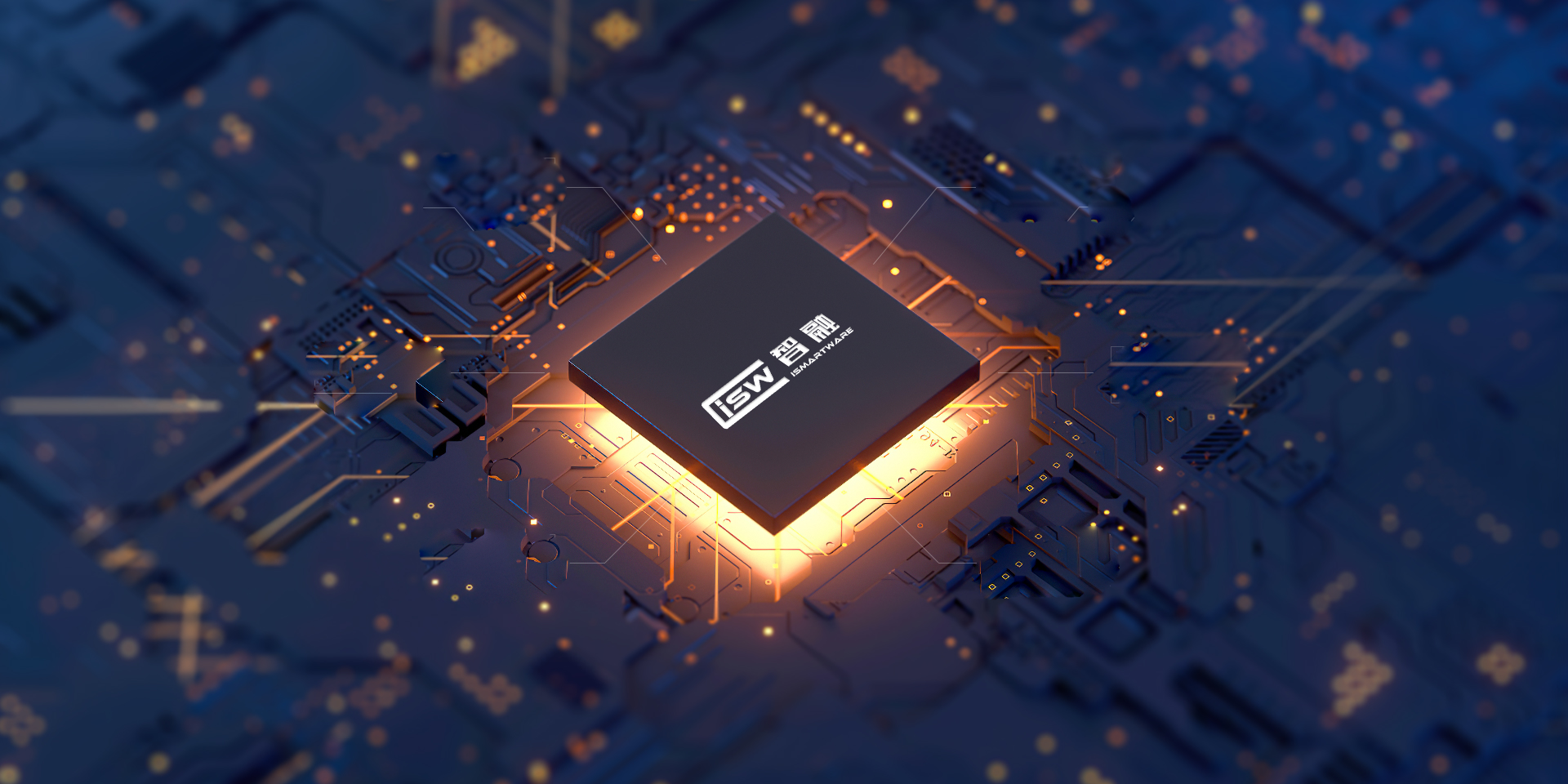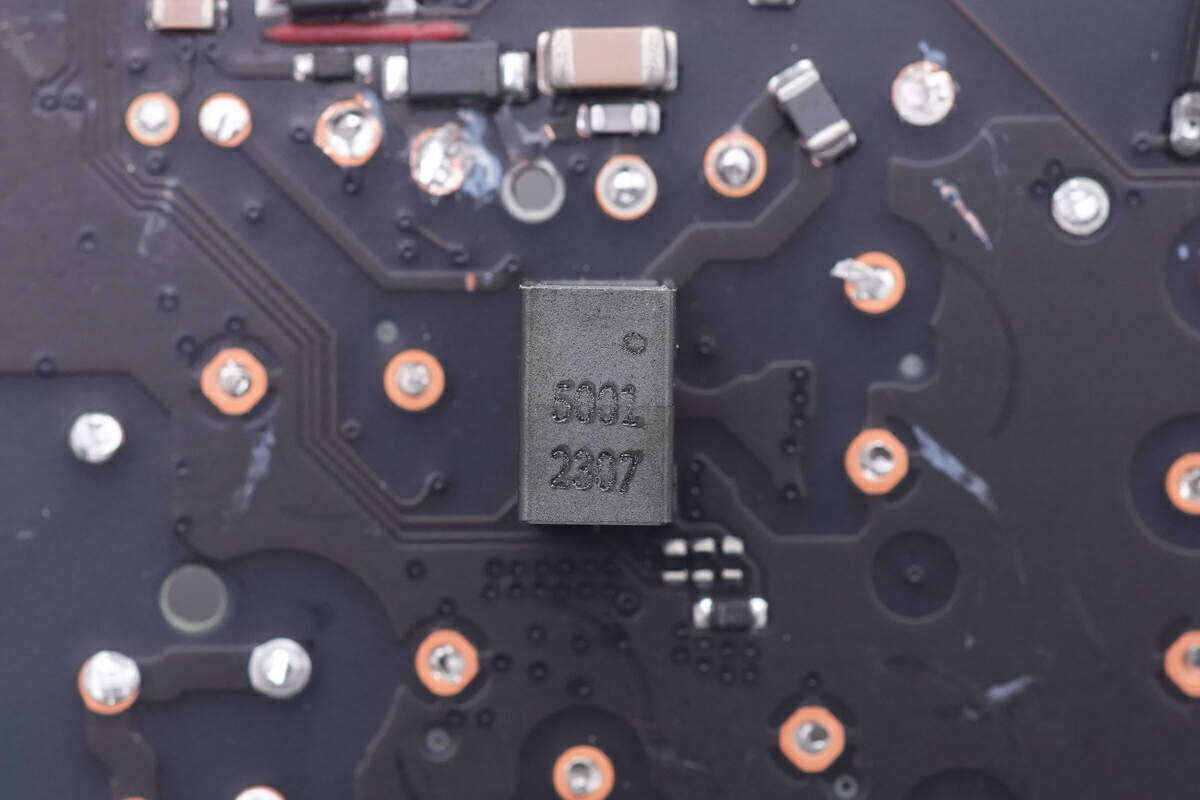Introduction
In recent years, new technologies like Gallium Nitride (GaN) and Silicon Carbide (SiC) have garnered significant attention, driving rapid development in the fast-charging industry. Fast-charging products are evolving with a trend towards multifunctionality, multiple ports, high power, and compact size. With the introduction of the latest USB PD3.1 fast-charging standard by the USB-IF Association and the official commercialization of Apple's 140W PD3.1 charger, numerous manufacturers throughout the industry chain have been drawn into the market. The chip industry surrounding the USB PD3.1 fast-charging standard continues to expand, laying a solid foundation for the future explosion in higher power markets.
Significant Upgrade in Fast Charging Standards
In May 2021, the USB-IF association officially released the USB PD3.1 fast charging standard, significantly increasing the maximum charging power to 240W. Additionally, the standard introduced three sets of fixed output voltage values (28V, 36V, and 48V) and three sets of adjustable AVS (Adjustable Voltage Supply) ranging from 15V to 28V, 15V to 36V, and 15V to 48V.
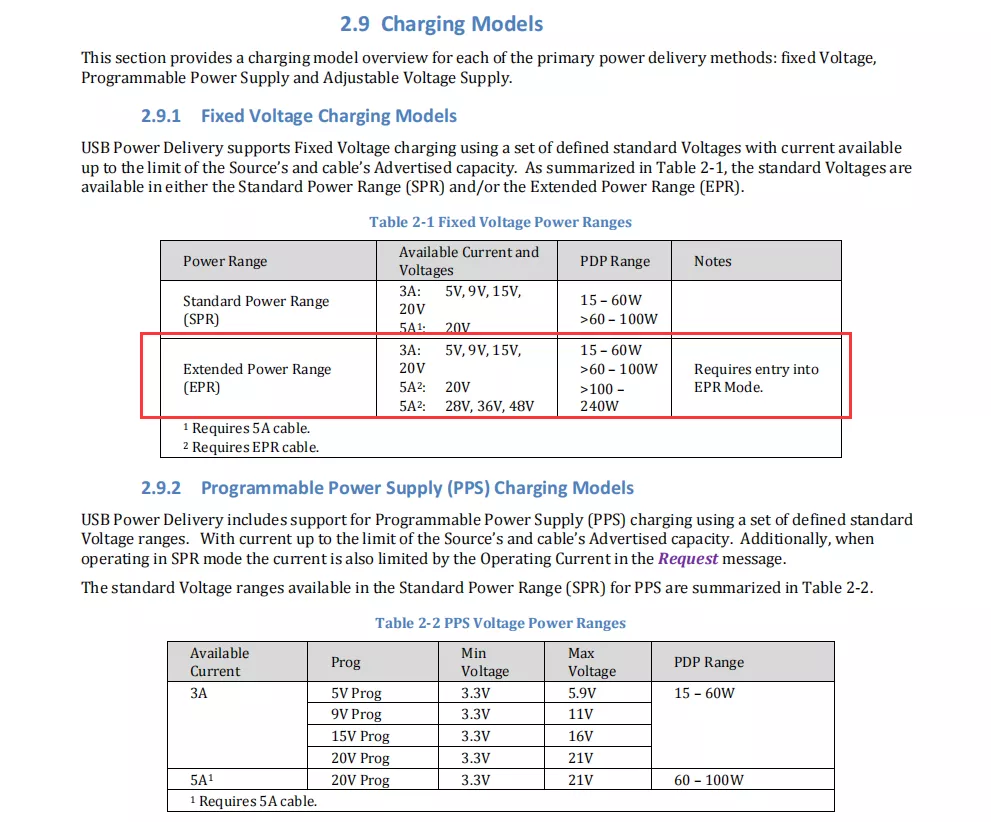
The latest USB PD3.1 fast charging standard represents an advanced version of the PD3.0 standard, encompassing all aspects of PD3.0 while ensuring full backward compatibility. In terms of nomenclature, USB PD3.0 is gradually being replaced by USB PD3.1 SPR (Standard Power Range). Products featuring PD fast charging with power up to 100W can be referred to as USB PD3.1 SPR devices, while those with power exceeding 100W fall under the USB PD3.1 EPR (Extended Power Range) category.
Meeting the demands of the USB PD3.1 EPR application presents new challenges for power supply products, particularly for components within fast chargers such as the master control chip, protocol chip, MOSFET, capacitor, transformer, and connector.
PD3.1 Fast Charging Protocol Chips
Actually, we've already compiled two summaries of PD3.1 protocol chips before. You can click on the related articles at the end of the post to view them. This time, we've added even more excellent products. Take a look!
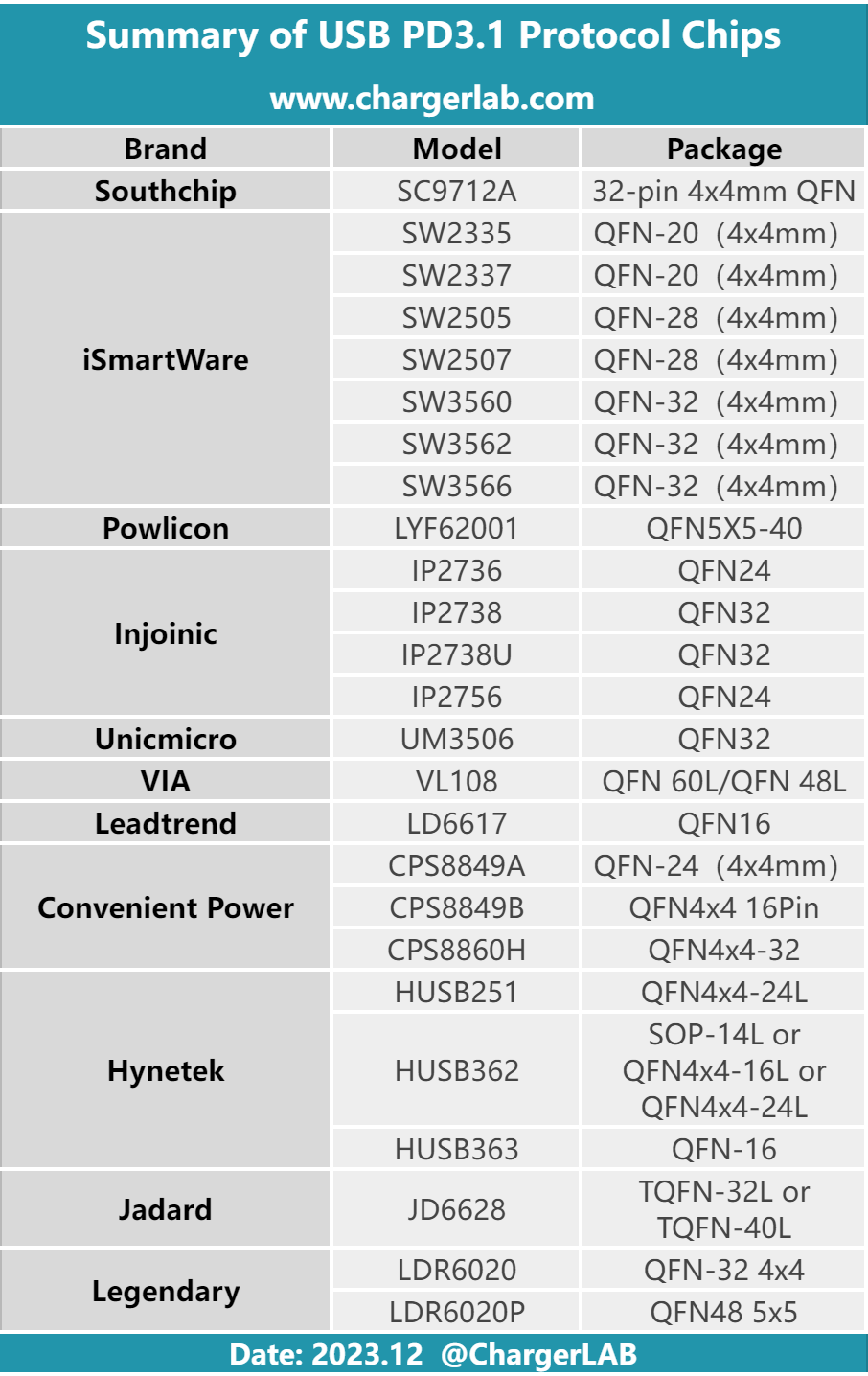
Southchip

Southchip is a high-performance semiconductor design company specializing in power, battery management, and embedded systems. They have multiple product lines including charge pumps, DC/DC converters, AC/DC converters, wired charging, wireless charging, and fast charging protocols.
Leveraging their independently developed technologies in voltage boosting and bucking charging, charge pumps, and GaN direct drive, they've introduced several high-performance products that have gained widespread recognition within the industry.
Southchip SC9712A
SC9712A is a high integrated dual-port fast charging SoC, supporting multi fast charging protocols. It integrates 36V high-efficiency synchronous buck controller, and with a set of Type C interface and 2xDpDM fast charging protocols control interfaces. lt minimizes external components to realize dual-USB port (1C1A, Type C+ USB A) fast charging. It provides up to 140W charging power for portable devices such as computers, tablets,and mobie phones.
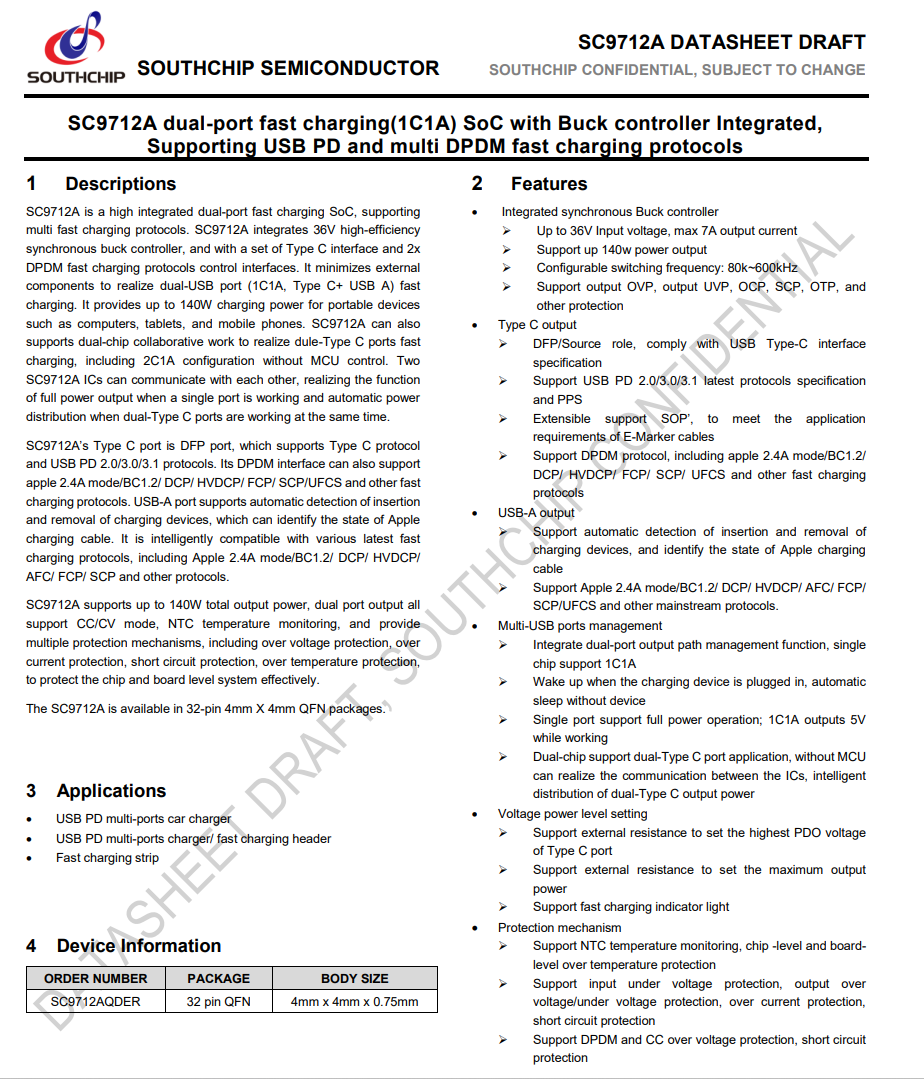
It's Type C port is DFP port, which supports Type C protocol and USB PD 2.0/3.0/3.1 protocols. Its DPDM interface can also support apple 2.4A mode/BC1.2/ DCP HVDCP/ FCP/ SCP/UFCS and other fast charging protocols. Furthermore, Southchip SC9712A has successfully obtained UFCS certification with certificate number 0302347160790R0M-UFCS00042.
iSmartWare

iSmartWare is a digital-analog hybrid chip design company specializing in power management chips. Their primary focus revolves around research, design, and sales of power management chips. iSmartWare's products find extensive application in power banks, in-car chargers, GaN chargers, outdoor energy storage units, and smart outlets, among other devices.
SW2335
iSmartWare SW2335 is a highly integrated fast charging protocol controller. It embeds an ARM Cortex-M0 core, with a maximum operating frequency of 40MHz, and supports general peripheral interfaces like I2C, UART, and GPIO.
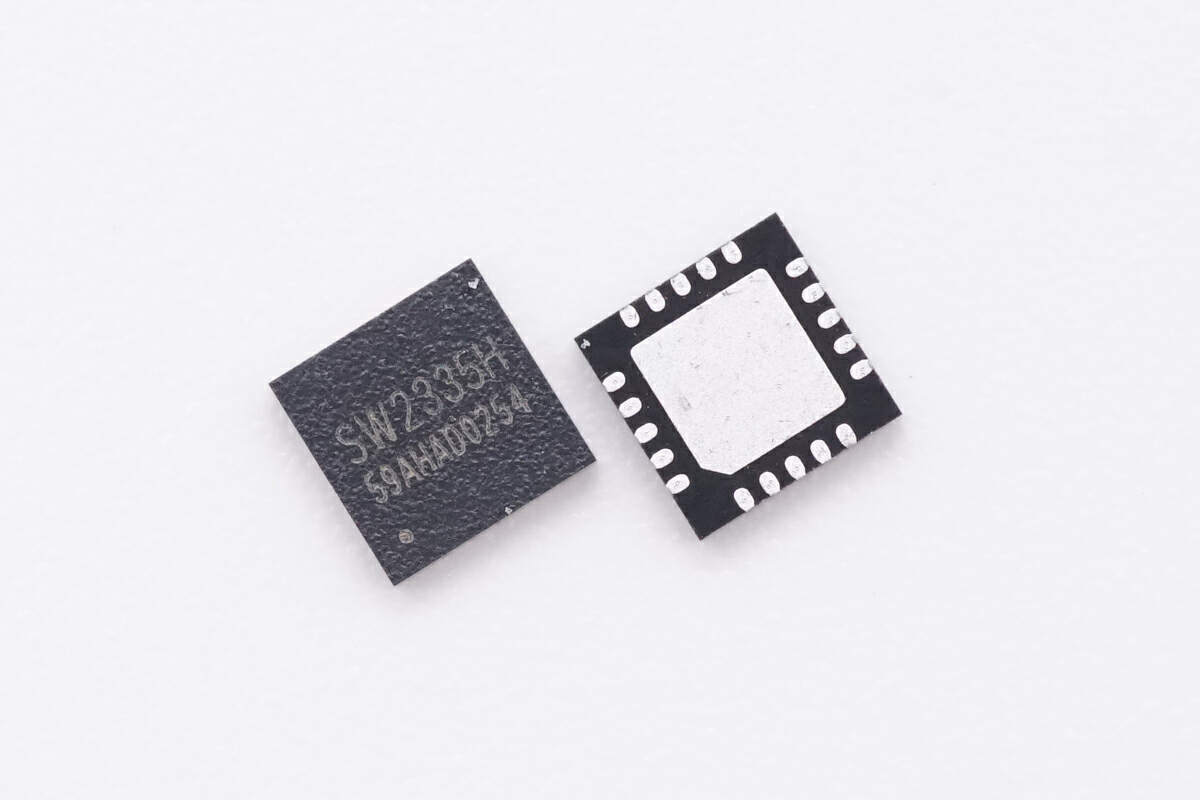
It supports PD3.1, BC1.2, UFCS, and various mainstream DPDM fast charging protocols.
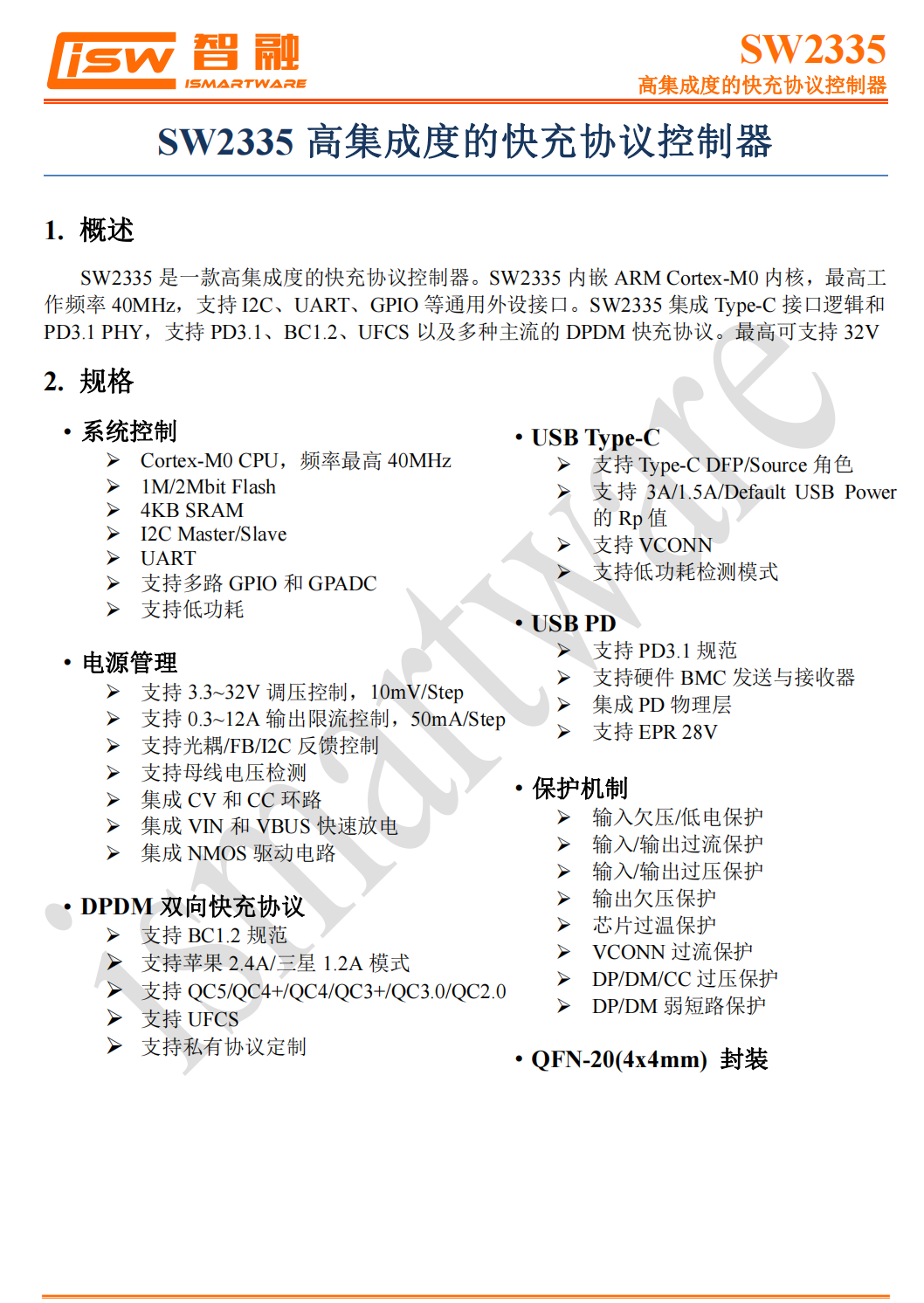
The chip integrates CV and CC loops, and inside the chip, multiple protection functions are integrated, with a QFN-20 (4x4mm) package.
SW2337
SW2337 is equipped with an ARM Cortex-M0 CPU and accepts input voltages ranging from 3.3V to 32V. It features multiple control methods, including optocouplers, feedback voltage (FB), I2C feedback, making it suitable for managing power supply and communication. Additionally, it adopts a 12-bit ADC and flash memory, providing both high-performance and data storage capabilities.
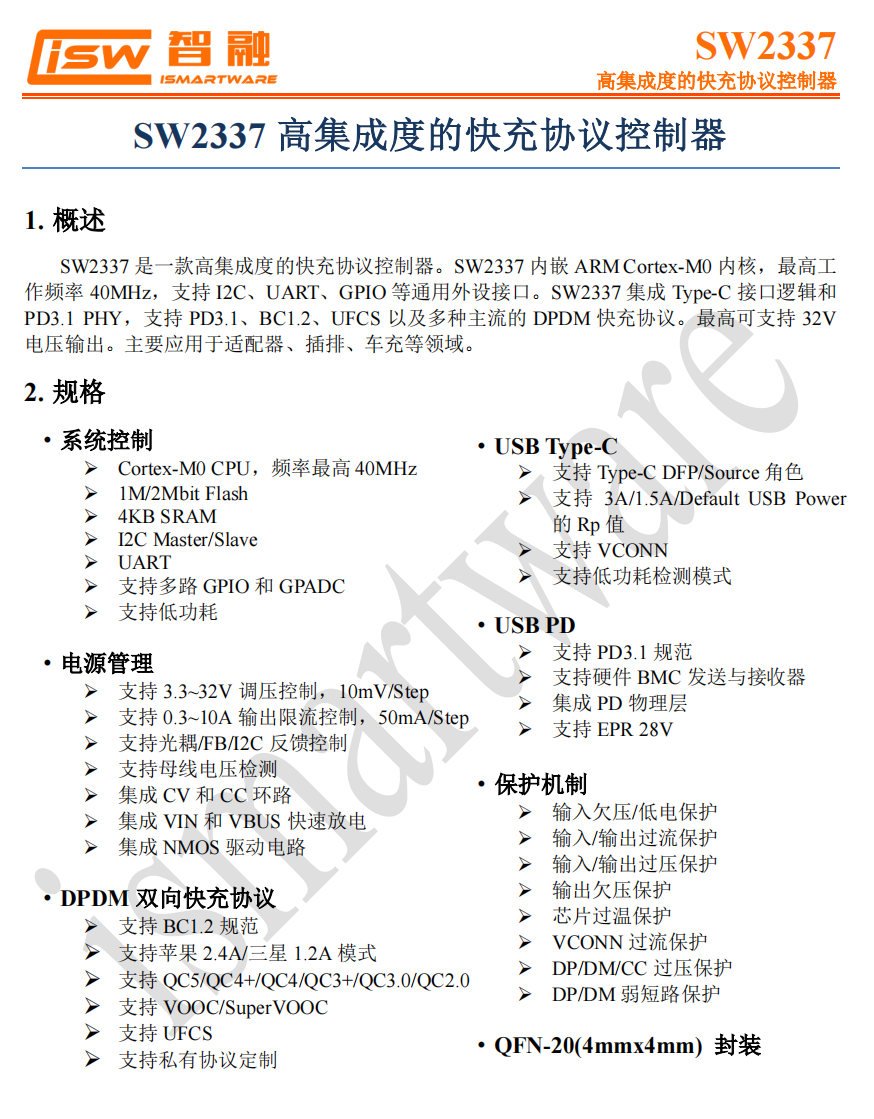
It supports various charging protocols, including but not limited to PD3.1, backward compatibility with PD3.0, QC5, SVOOC, FCP, AFC, SCP, TFCP, and more. It comes in a QFN4x4-20 package.
SW2505
iSmartWare SW2505 is a low-power controller chip that supports PD3.1, QC, UFCS, and other protocols, with an integrated MCU and 16 GPIOs. The USB-C port supports online upgrades and online simulation debugging, and it also supports optocoupler/FB control and I2C master/slave mode.
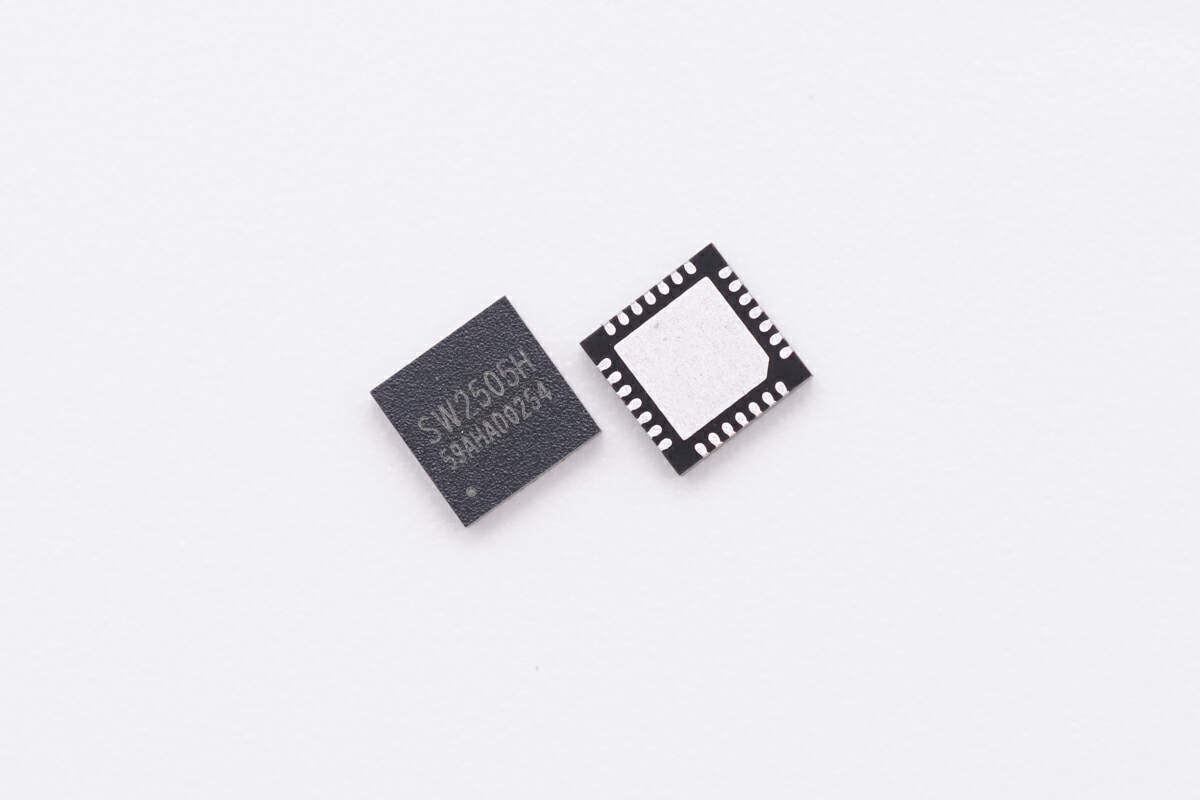
It supports PD3.1, QC, UFCS, SCP, AFC, VOOC, SFCP, PE, and other mainstream fast charging protocols, with an embedded ARM Cortex-M0 core, 128K Flash, and 4K SRAM.
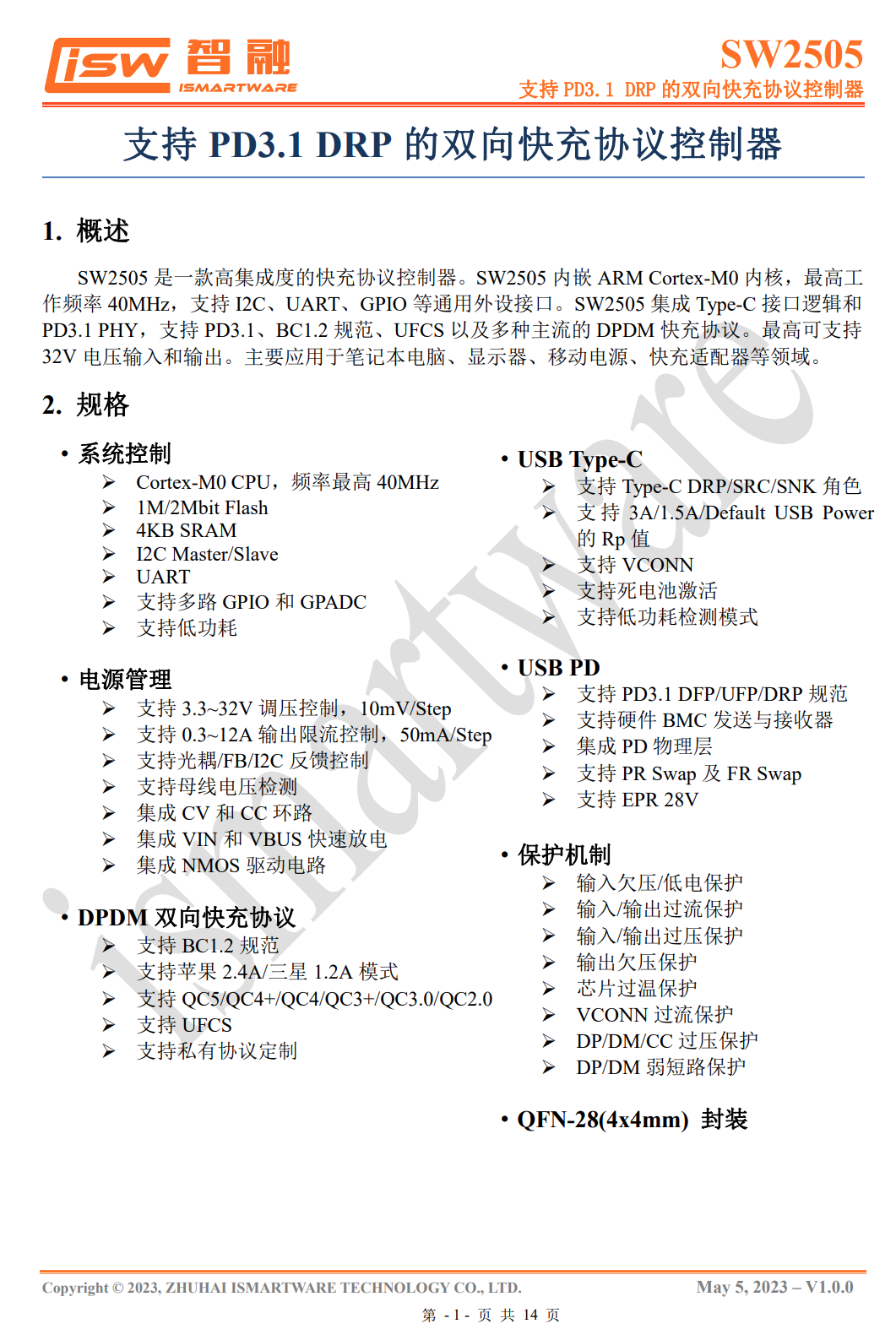
It integrates output CV/CC loop control, NMOS driver control, 12-bit ADC converter, as well as multiple protection measures such as overvoltage protection, undervoltage protection, and overcurrent protection.
SW2507
SW2507 is embedded with an ARM Cortex-M0 CPU and accommodates input voltages ranging from 3.3V to 32V. It features multiple feedback control methods, such as optocouplers, feedback voltage (FB), and I2C feedback, making it suitable for managing power supply and communication. Additionally, it adopts a 12-bit ADC and built-in flash memory, providing high-performance and data storage capabilities.
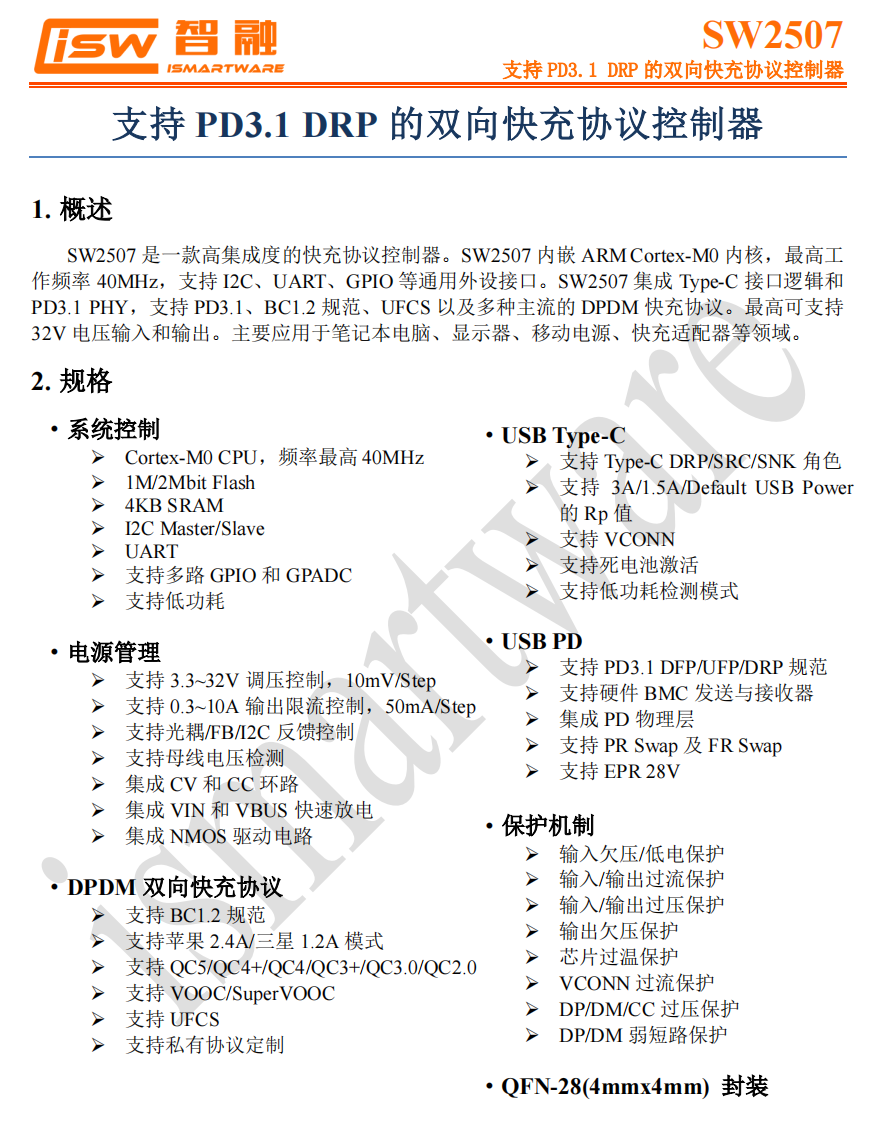
It also supports the PD3.1 protocol and is backward compatible with PD3.0/2.0, QC5, SVOOC, FCP, AFC, SCP, and more. It is packaged in a QFN4x4-28 form.
SW3560
SW3560 is a protocol chip that integrates a 7A Buck controller. It features a Cortex-M0 CPU with a maximum frequency of 40MHz, 1M/2Mbit Flash, 4KB SRAM, and supports I2C and UART communication. Notably, it supports a power output of up to 140W and various protocols, including the latest PD3.1 SPR and EPR, SCP/FCP, QC5, AFC, PE2.0, and more.
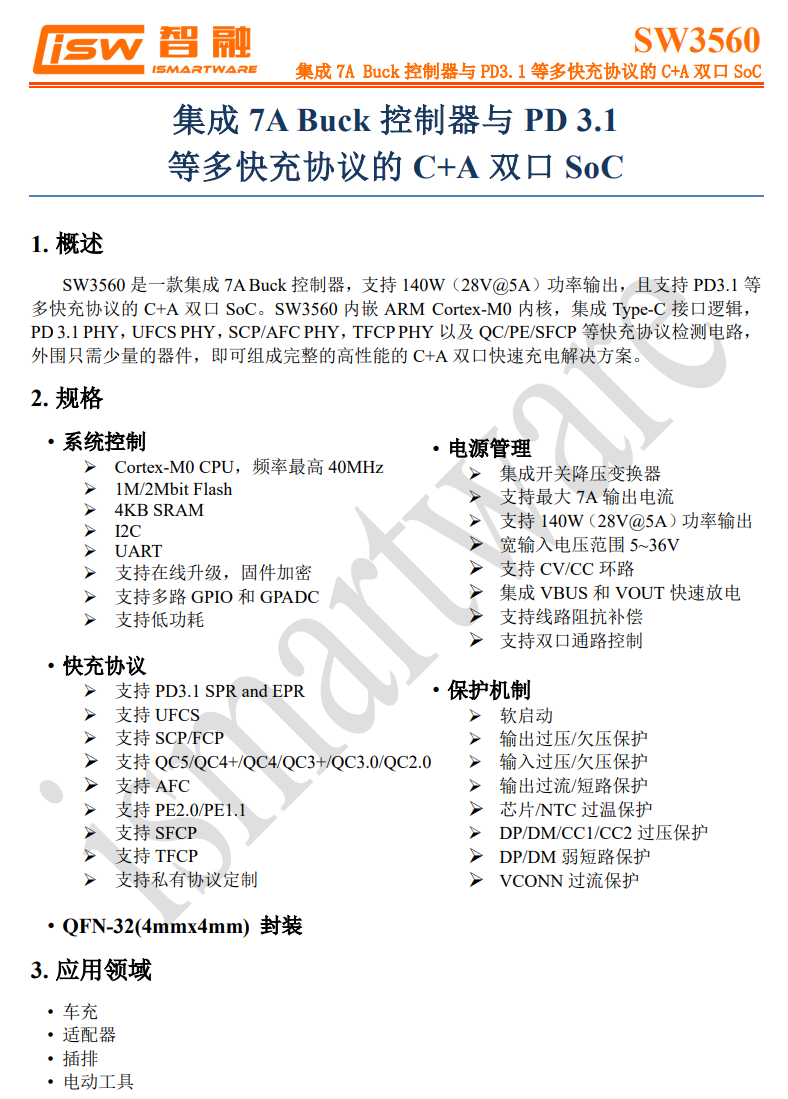
It offers excellent performance and protection mechanisms, with an input voltage range of 5V to 36V. Additionally, it integrates rapid discharge functions for VBUS and VOUT, enhancing performance and flexibility. The chip provides comprehensive protection measures, including soft start, overvoltage/undervoltage, and VCONN overcurrent protection. It is suitable for applications in car chargers, power adapters, power strips, power tools, and energy storage devices, and it comes in a QFN-32(4mmx4mm) package.
SW3562
SW3562 is an enhanced version of SW3560 with added support for the VOOC protocol, enabling fast charging for OPPO and OnePlus smartphones.
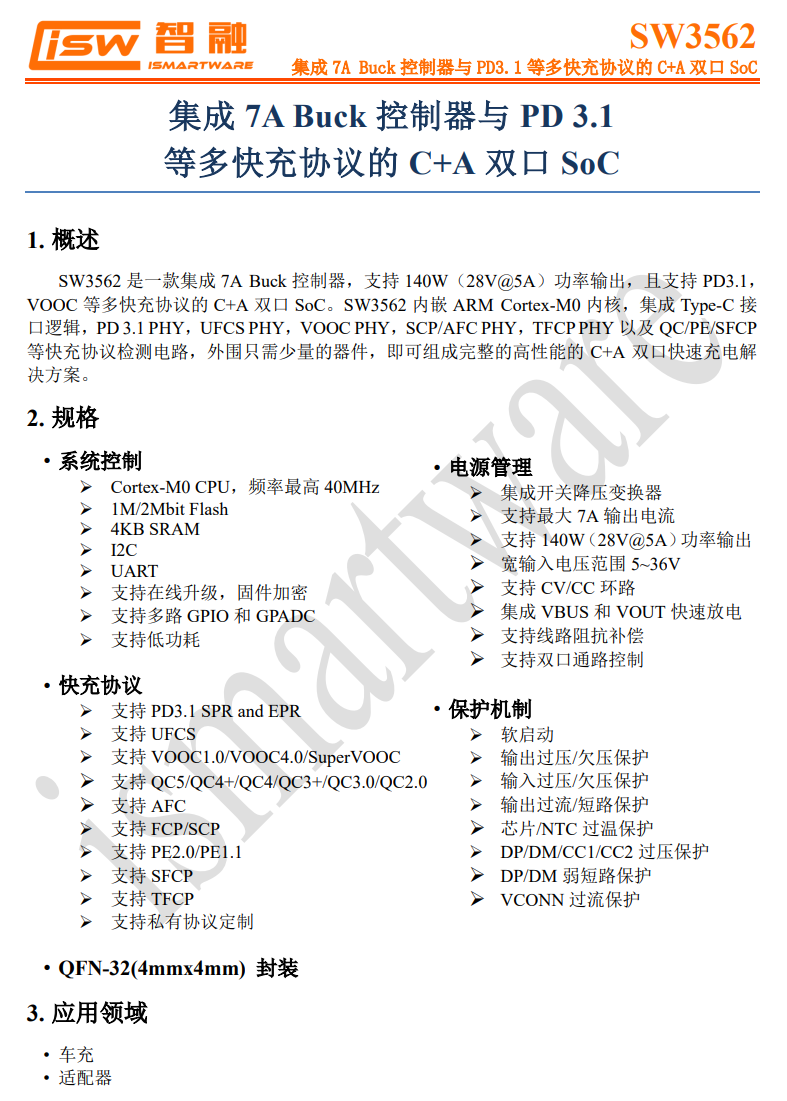
Like SW3560, it integrates a 7A Buck controller, Cortex-M0 CPU with a maximum frequency of 40MHz, 1M/2Mbit Flash, 4KB SRAM, and supports I2C and UART communication. It also supports multiple GPIO and GPADC inputs and offers a power output of up to 140W. The chip supports various protocols, including PD3.1 SPR and EPR, SuperVOOC, SCP/FCP, QC5, PE2.0, and more.
It provides exceptional performance and protection mechanisms, with a 5V to 36V input voltage range, CV/CC loop control, and integration of impedance compensation and dual-path control. The chip also includes various protection features such as overvoltage/undervoltage, chip/NTC over-temperature, DP/DM weak short-circuit, ensuring system safety. It is suitable for use in car chargers, power adapters, power strips, power tools, and energy storage devices, and it also adopts QFN-32(4mmx4mm) package.
SW3566
SW3566 is another improved version of SW3560, with the A+C configuration updated to C+C, while the rest remains the same.
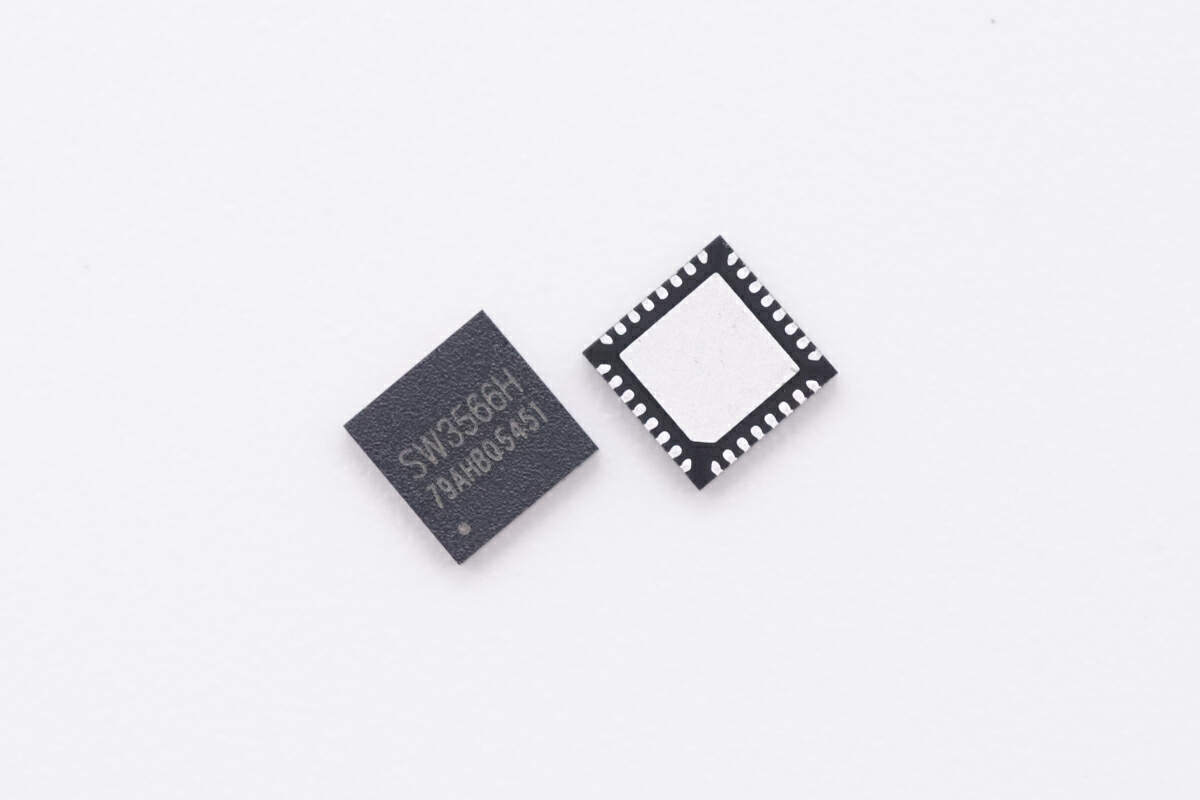
Similar to SW3560, it integrates a 7A Buck controller, Cortex-M0 CPU, 1M/2Mbit Flash, 4KB SRAM, and supports I2C and UART communication. It supports a power output of up to 140W and a variety of protocols, including PD3.1 SPR and EPR, SCP/FCP, QC5, AFC, PE2.0, and more.
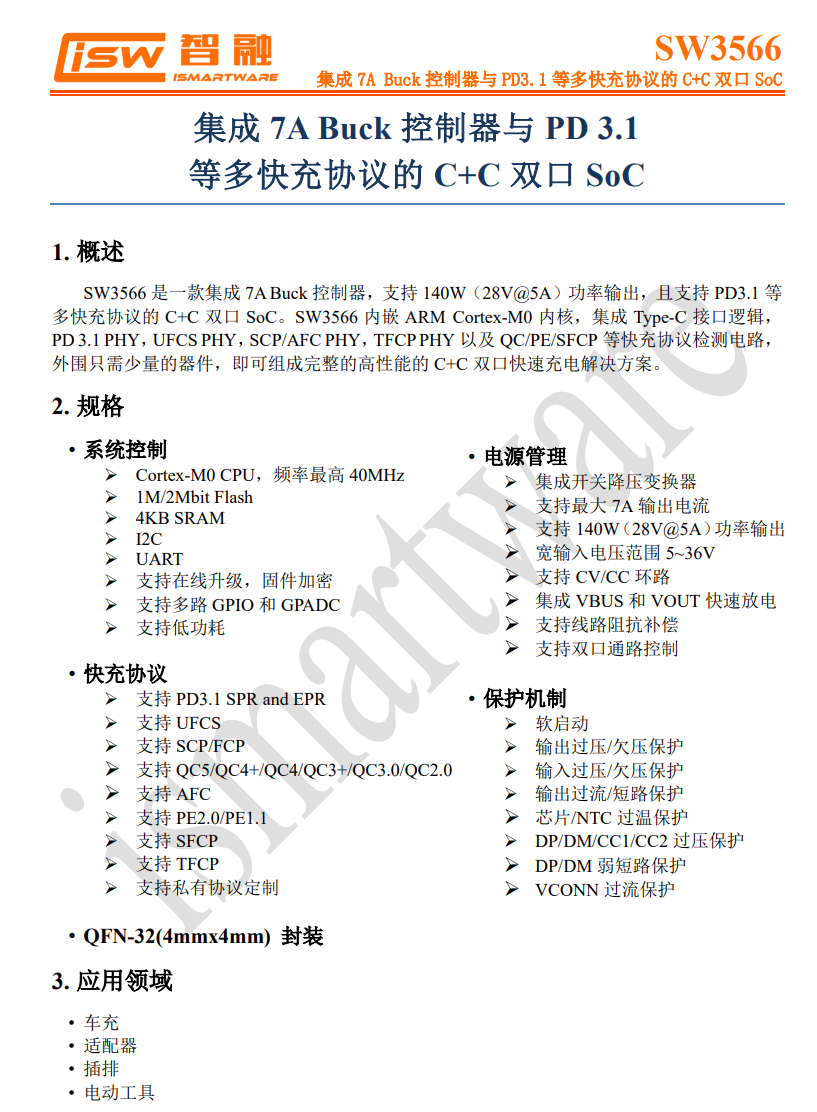
The chip offers excellent performance and protection mechanisms, with an input voltage range of 5V to 36V. It also integrates rapid discharge functions for VBUS and VOUT, enhancing performance and flexibility. Additionally, it includes various protection measures, such as soft start, overvoltage/undervoltage, and VCONN overcurrent protection, making it suitable for applications in car chargers, power adapters, power strips, power tools, and energy storage devices, and it comes in a QFN-32(4mmx4mm) package.
Powlicon

Powlicon brings years of experience in research, operations, and management within the electronics industry. They specialize in providing power management chips and hold substantial expertise in the DC-DC, AC-DC, battery management, and mixed-signal SoC-related markets.
Powlicon LYF62001
Powlicon LYF62001 is a high efficiency, synchronous bi-directiona buck-boost charger with integrated fast charge protocols. It supports charging and discharging of 1 to 6 series 4.2V and 3.5V batteries, as well as 1A1C port applications, designed for most of fast charging applications with type-C port and PD protocol.
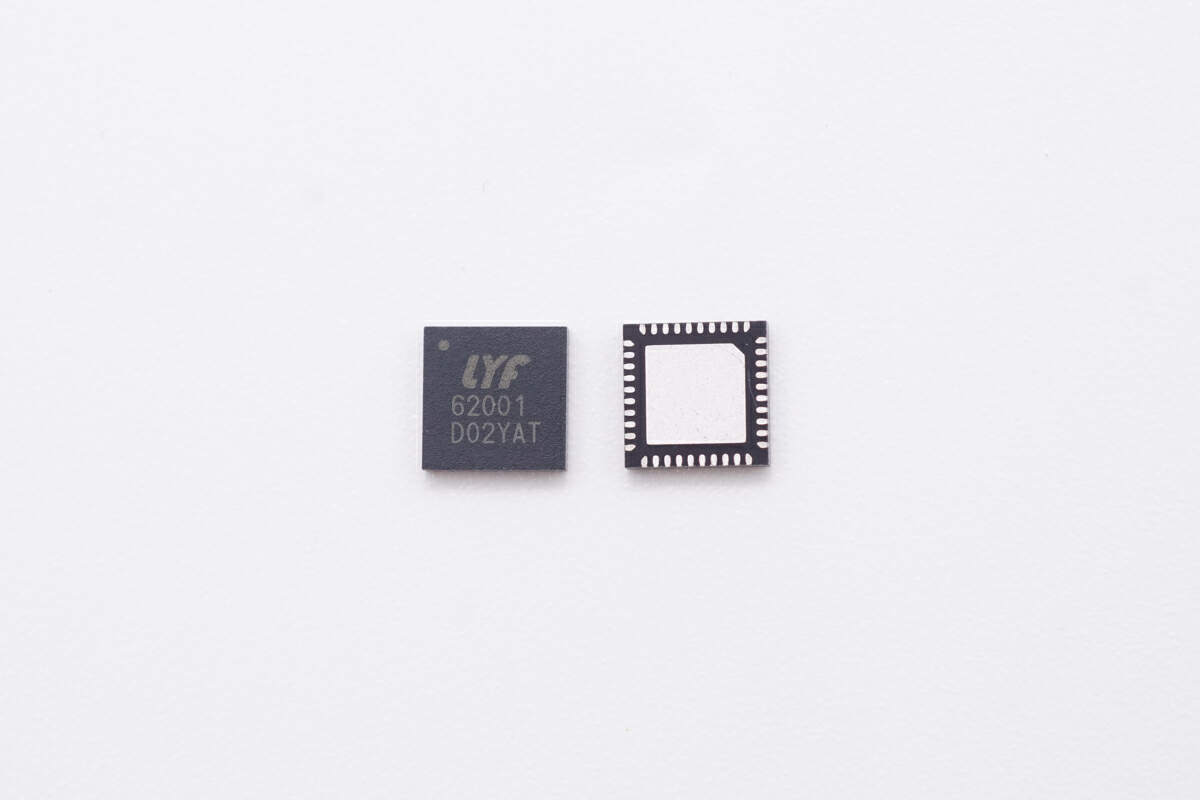
The LYF62001 features programmable functionalities for step-down charging, step-up charging, or buck-boost charging. Through the I2C interface, it communicates with MCUs, enabling high-voltage sensing for batteries and bus terminals. To ensure stable communication signals in USB ports, the LYF62001 also provides high-voltage isolation for CC1, CC2, DP, and DM communication signals.
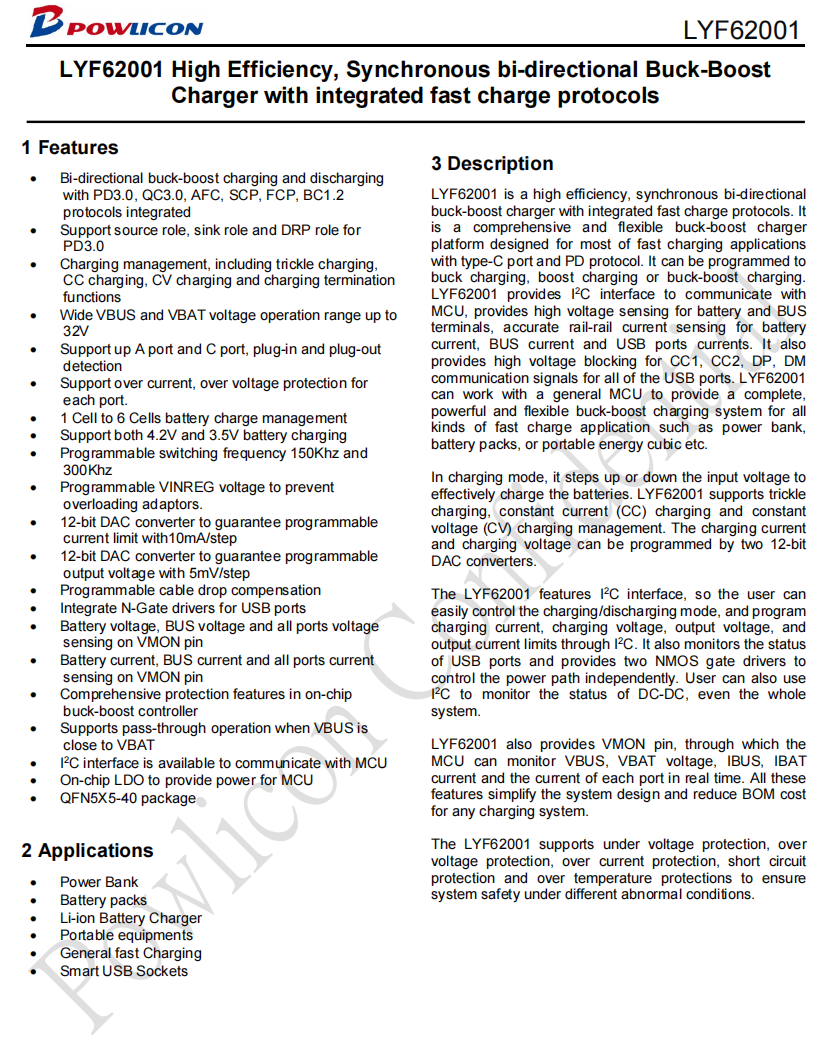
In charging mode, the LYF62001 has the capability to efficiently charge batteries by stepping up or stepping down the input voltage. It supports trickle charging, constant current (CC) charging, and constant voltage (CV) charging management. Additionally, it allows programming of charging current and voltage through two 12-bit DAC converters. Moreover, the LYF62001 can monitor the status of the USB port, supporting detection for insertion and removal in both A and C ports. Users can also use I2C to monitor the status of DC-DC converters or the entire system.
The LYF62001 supports mainstream fast charging protocols in the market, including PD3.1, FCP/SCP, BC1.2, QC3.0, among others. It operates over a wide VBUS and VBAT voltage range, up to 32V. Furthermore, its programmable switch frequency is set at 150KHz and 300KHz.
Packaged in QFN5x5-40, the LYF62001 caters to various fast charging applications by providing a comprehensive, robust, and flexible buck-boost charging system.
Injoinic

Injoinic is a high-performance, high-quality mixed-signal chip design company specializing in power management chips and fast charging protocol chips. Their primary business revolves around the research, development, and sales of power management chips and fast charging protocol chips. The power management chips and fast charging protocol chips offered by Injoinic find wide applications in products such as power banks, fast charging power adapters, wireless chargers, in-car chargers, and charging cases for wireless earbuds, among others.
IP2736
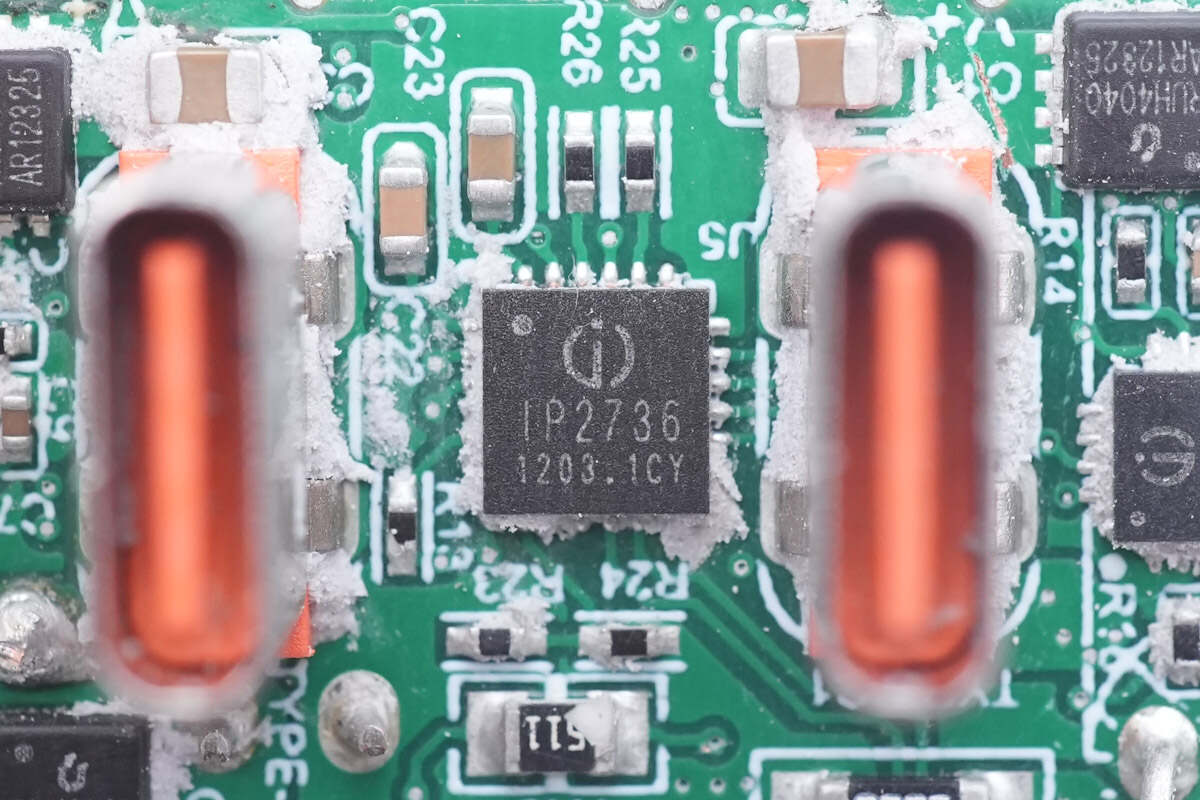
Injoinic's IP2736 protocol chip integrates voltage references, programmable voltage/current loop control, and low-end current detection, with output supporting line loss compensation. It can be used in areas such as car chargers, energy storage power supplies, chargers, power banks, electric tools, etc.
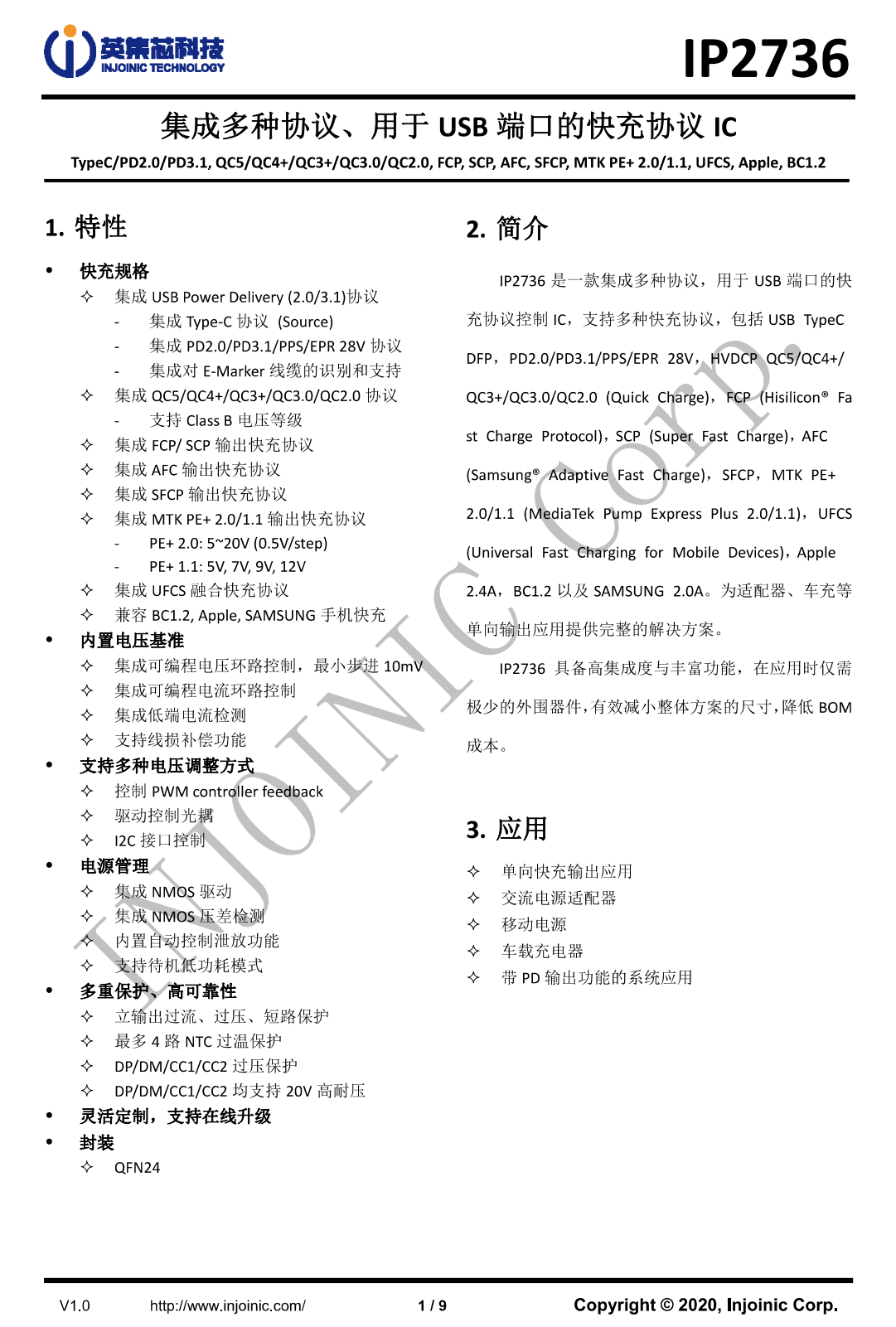
Thanks to support for multiple feedback forms, IP2736 can be paired with QR, ACF, LLC, and other circuit architectures for PD fast charging, as well as with buck boost circuits for high-power car chargers and power banks, etc.
IP2738
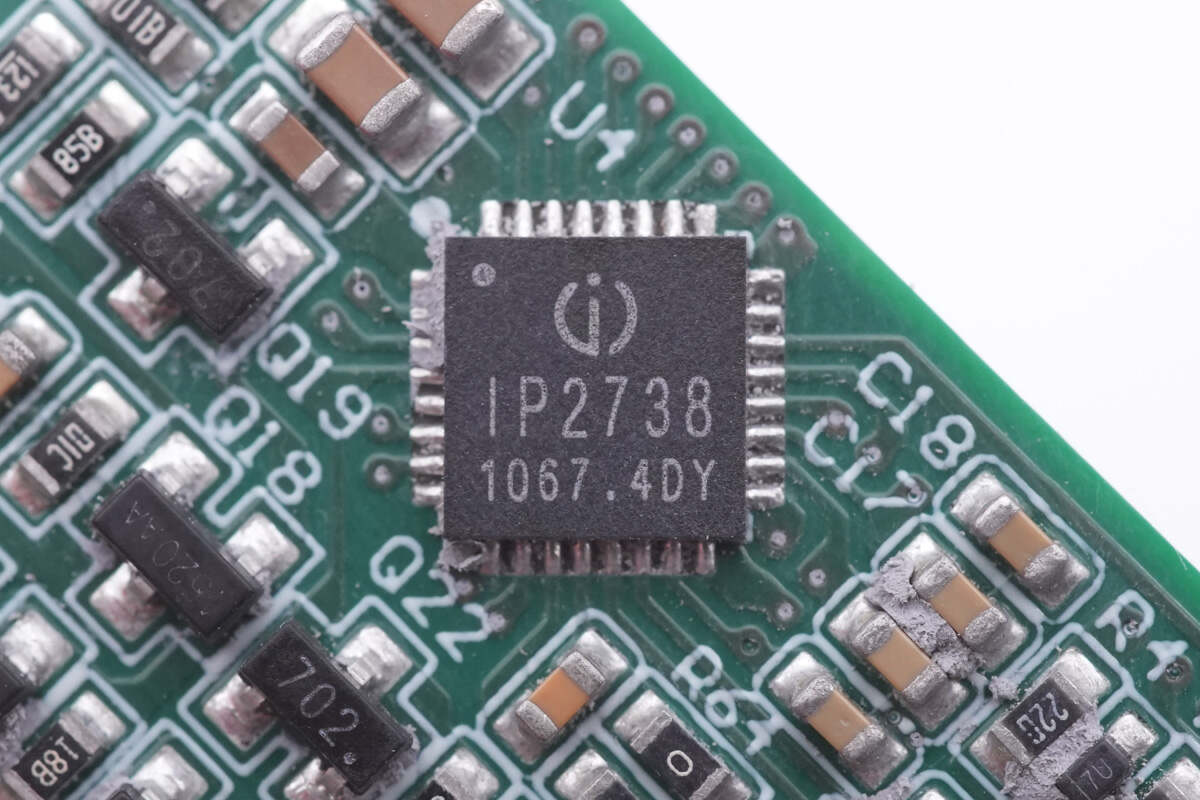
Injoinic's IP2738 is a two-way protocol chip supporting fast charging applications with dual-port power range from 18W to 140W. It has independent feedback control and USB PD control, equivalent to integrating two IP2736 chips into one, naturally having the same fast charging specifications. It supports USB PD3.1 28V EPR and a wide range of fast charging protocols, with excellent compatibility.
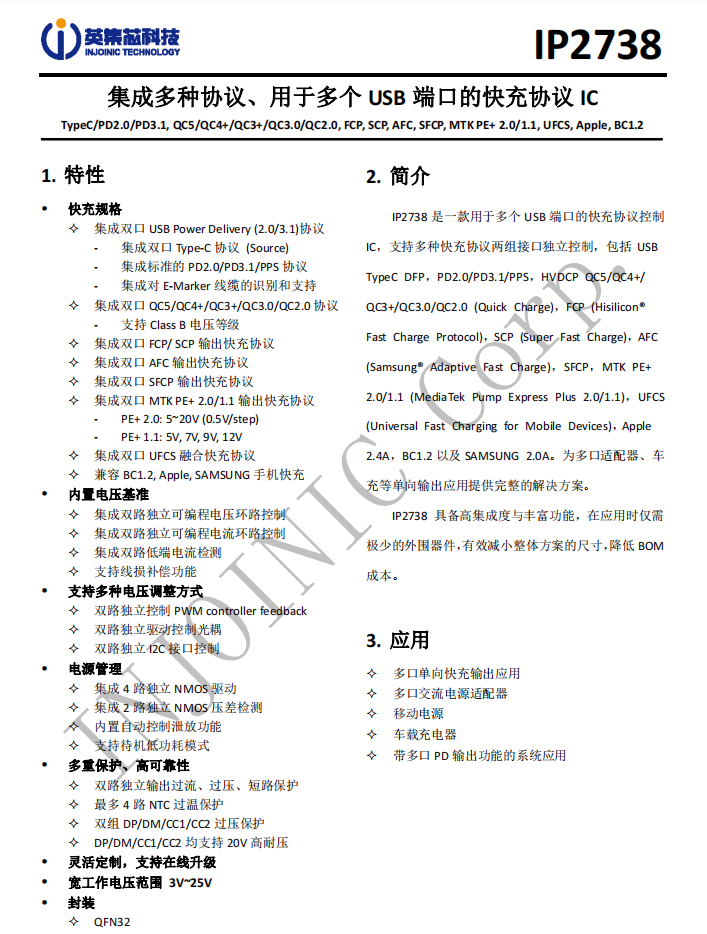
It also has four independent NMOS drivers, which can be used for multiple port output control, and supports two-way independent overcurrent, overvoltage, and short circuit protections, ensuring safe usage.
IP2738U
IP2738U is an upgraded version of the IP2738, enhanced with the addition of the UFCS universal fast charging protocol. Injoinic IP2738U is a fast charging protocol control chip suitable for multiple USB ports, supporting dual-port 18-140W fast charging applications. It features independent feedback control and independent USB PD control.
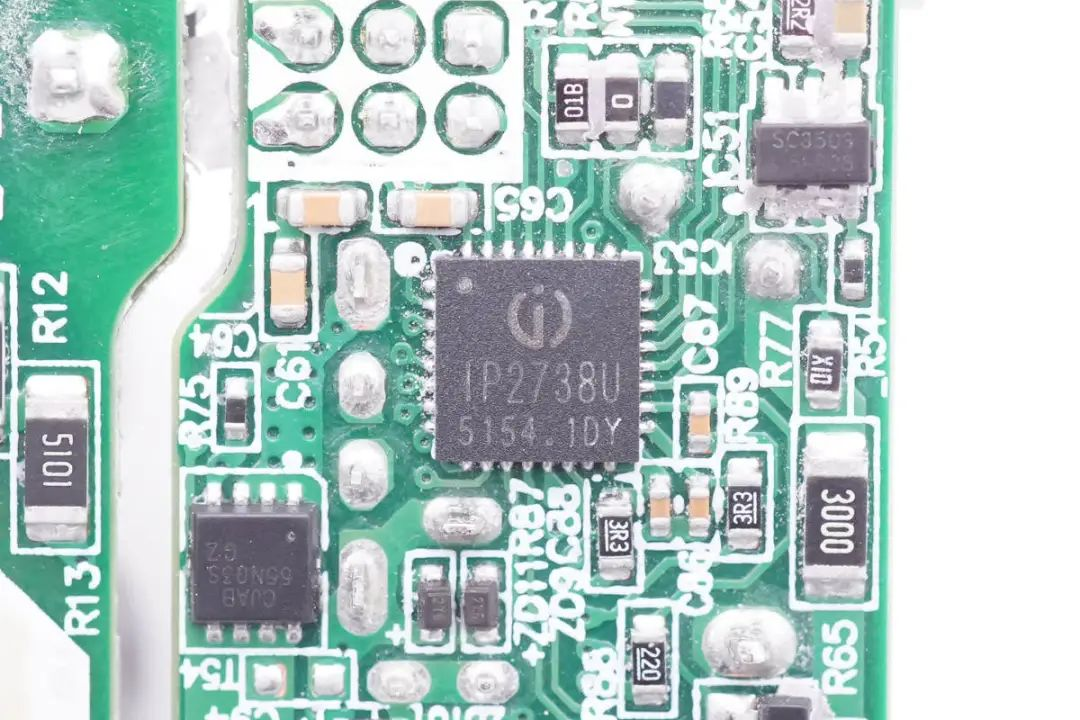
Integrated with dual-port USB PD3.1 and mainstream fast charging protocols, it incorporates dual-port Type-C recognition and supports E-marker cable identification. It has obtained UFCS Fusion Fast Charging certification and is backward compatible with fast charging protocols for phones such as BC1.2, Apple, Samsung, and others.
The IP2738U integrates dual independent programmable voltage and current loop controls, supporting line loss compensation. It accommodates various voltage adjustment modes and enables independent control of PWM controller feedback for dual ports. It incorporates automatic discharge control and supports standby low-power mode. Moreover, it includes dual independent output overcurrent and overvoltage protection mechanisms, built-in NTC open circuit detection to maximize device safety.
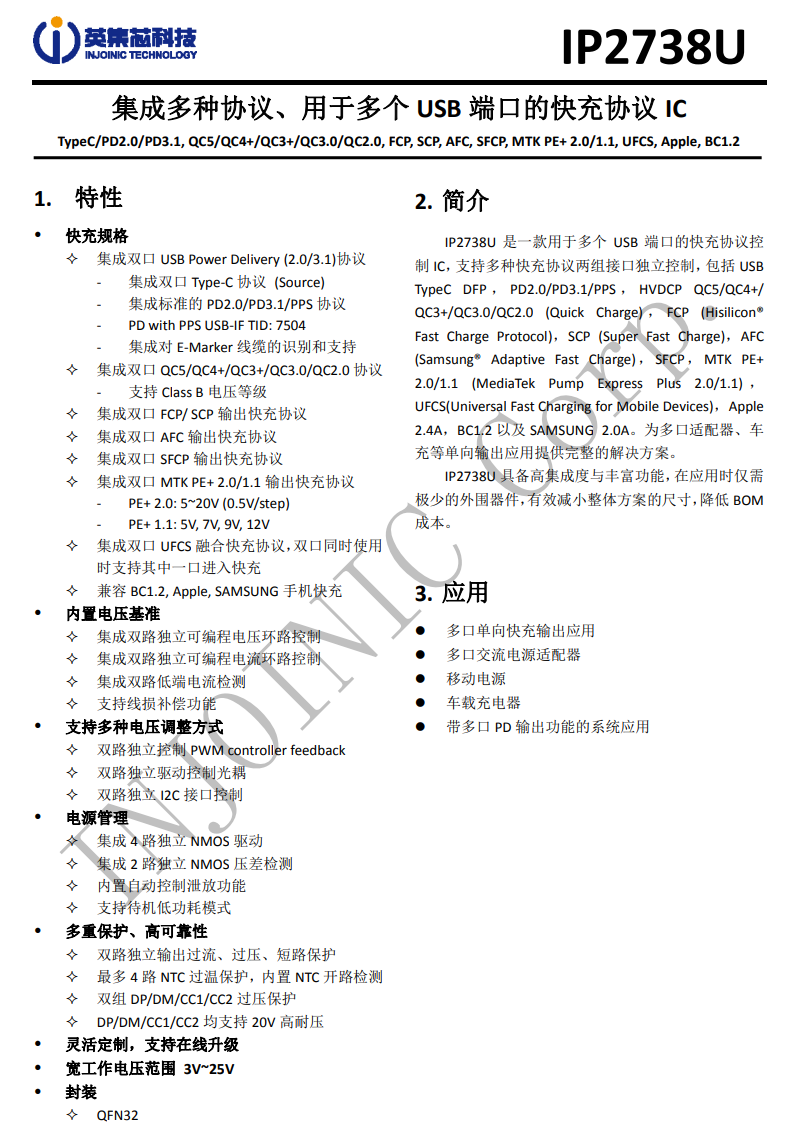
Supporting online upgrades and stable operation within the voltage range of 3V to 25V, the IP2738U comes in a QFN32 package, suitable for diverse unidirectional output applications.
IP2756
Injoinic's IP2756 is a multi-protocol integrated fast charging protocol control IC for USB ports, supporting PD2.0/PD3.1 SPR&EPR 36V, HVDCP, QC5/4+/3+/3.0/2.0, VFCP, UFCS, Apple 2.4A, BC1.2, and Samsung 2.0A, among many other fast charging protocols.
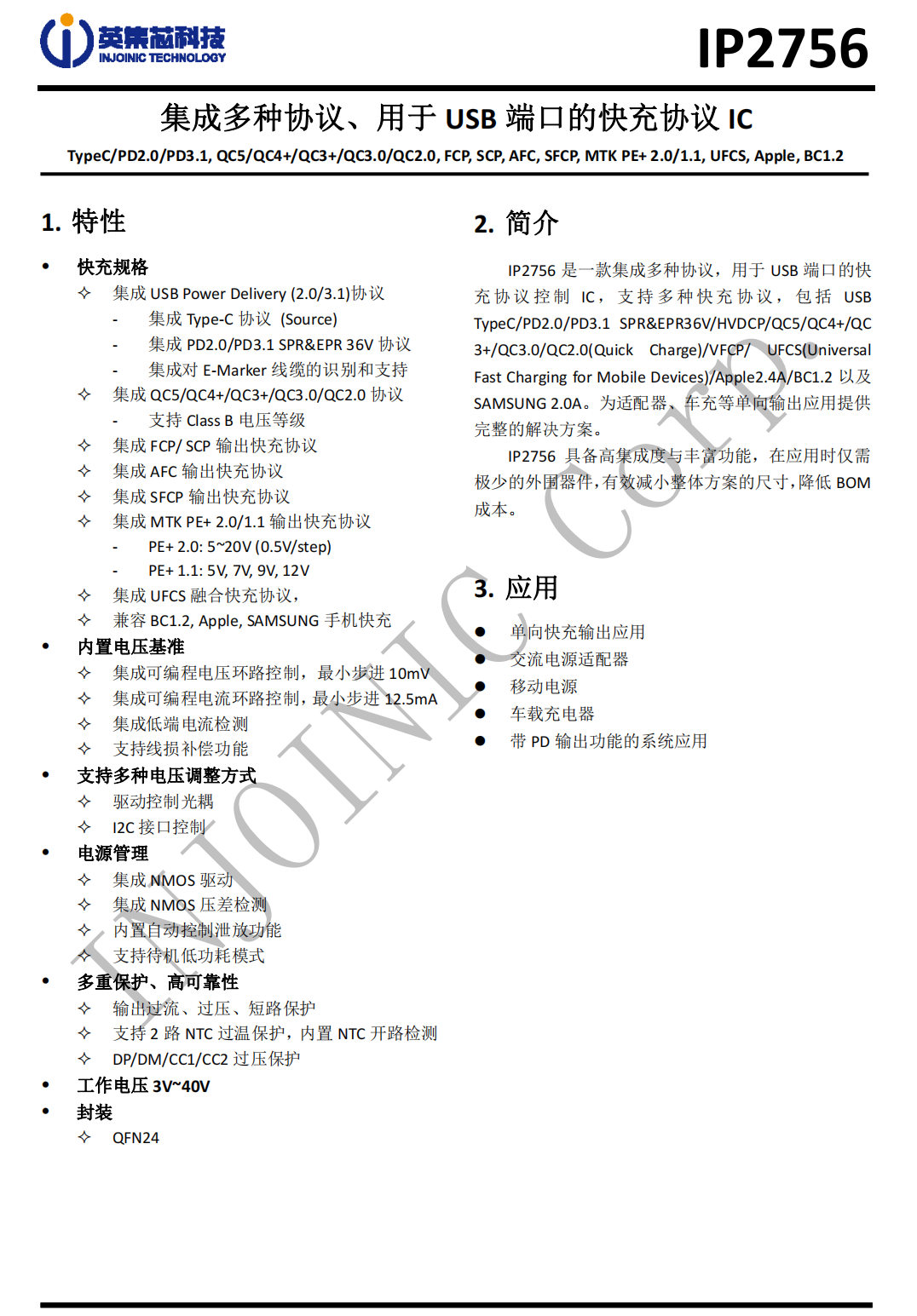
IP2756 features high integration and rich functionalities, requiring very few peripheral devices during application, effectively reducing BOM costs.
Unicmicro

Unicmicro specializes in photovoltaic renewable energy, the Internet of Things (IoT), industrial control, and automotive electronics industries. They offer differentiated microprocessor chips, high-performance analog and RF front-end chips, low-power IoT solution platforms, digital power solution platforms, and motor control solution platforms to their clients.
UM3506
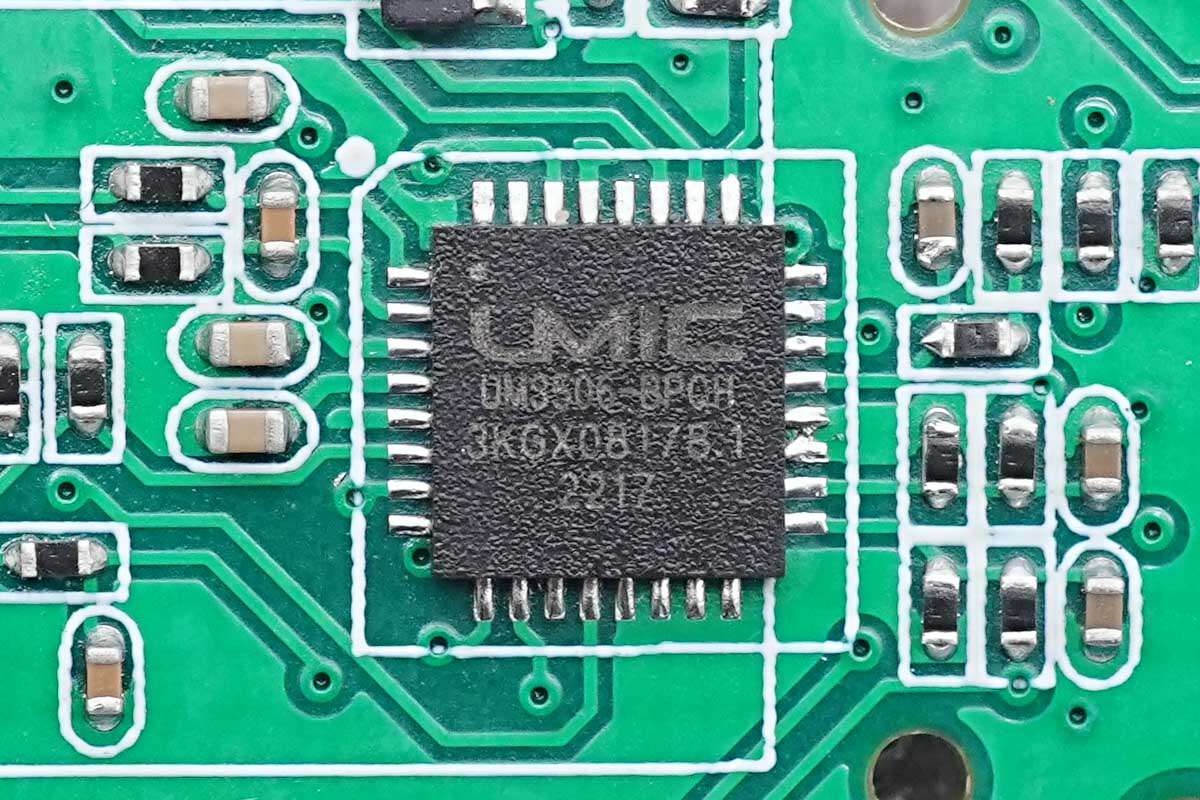
The Unicmicro UM3506-BPQH is a fast charging controller that supports PD3.1 and boasts full SRC/SNK/DRP support capability. It supports SPR, EPR (PD3.1) mode, and PD message chunk mode. The chip comes with a high-voltage LDO and supports 3.3-24V power supply.
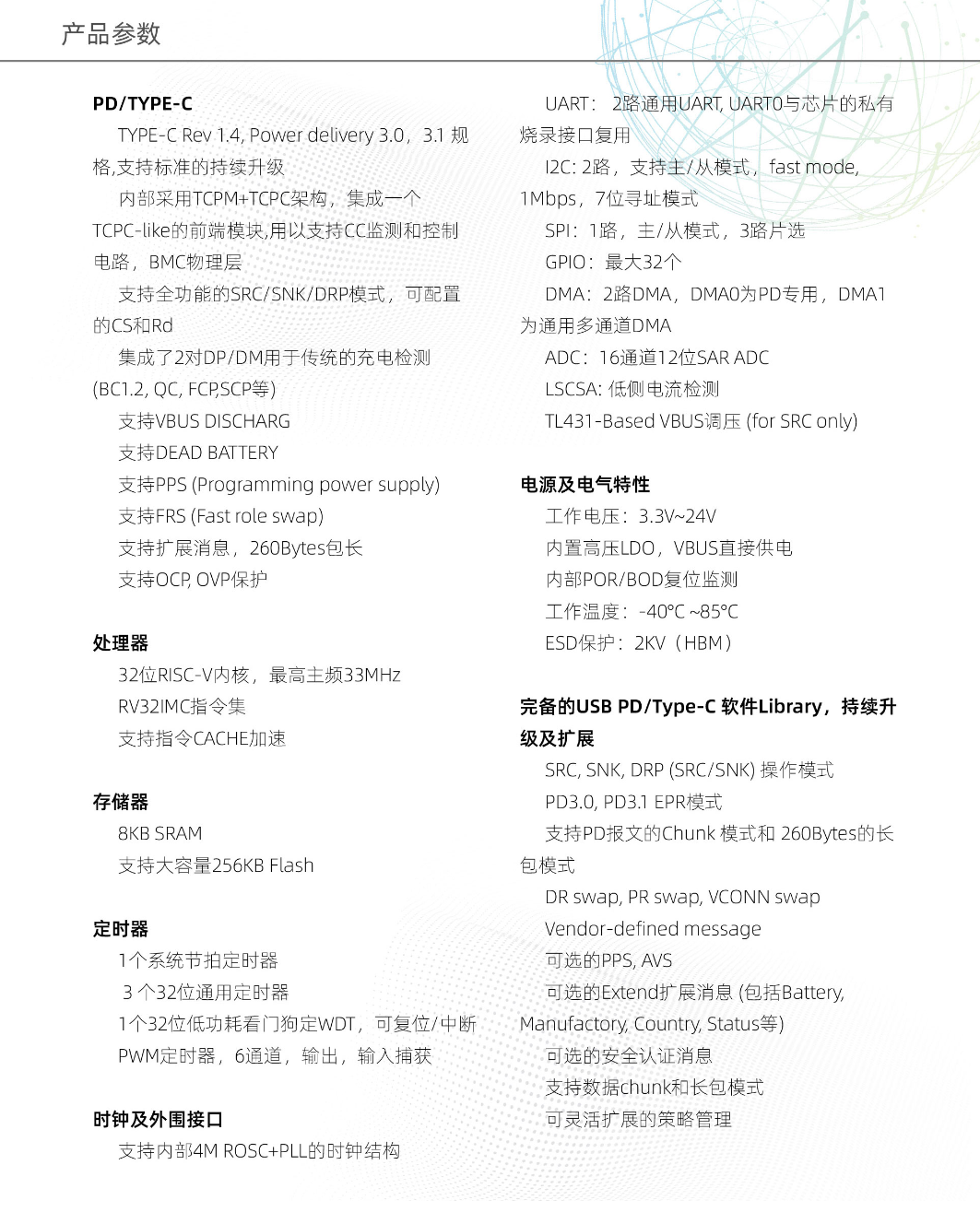
Featuring 2 pairs of DP DM pins, it supports BC, QC, and other protocols, allowing for flexible expansion. The chip is equipped with a high-performance 32-bit RISC-V core, with a maximum clock frequency of 33MHz, 8KB SRAM, and 256KB FLASH. It also has 2 UART and 2 I2C interfaces, along with one SPI interface, and supports low-side current detection. The chip adopts QFN32 package.
VIA

VIA specializes in the design, research, and sale of USB-related control chips, covering products from host-side to peripheral devices. They possess core technologies and chip solutions for USB4, high-speed transmission, USB Type-C, USB PD, among others. Their products find application in peripherals related to high-speed transmission and charging.
VIA VL108
VIA VL108 is a highly integrated single-chip DisplayPort Alt mode and PD 3.1 controller chip specifically designed for USB-C devices, ideal for use in USB-C multifunctional docking stations with charging capabilities. The VL108 incorporates USB-C Charging UFP, enabling video output functionality through DP Alt mode or USB4 DP tunneling, while also providing charging to the connected PD host upon detecting external power. It integrates two USB-C DRP DFP ports, capable of charging a PD host or connecting to USB-C devices for data transmission.
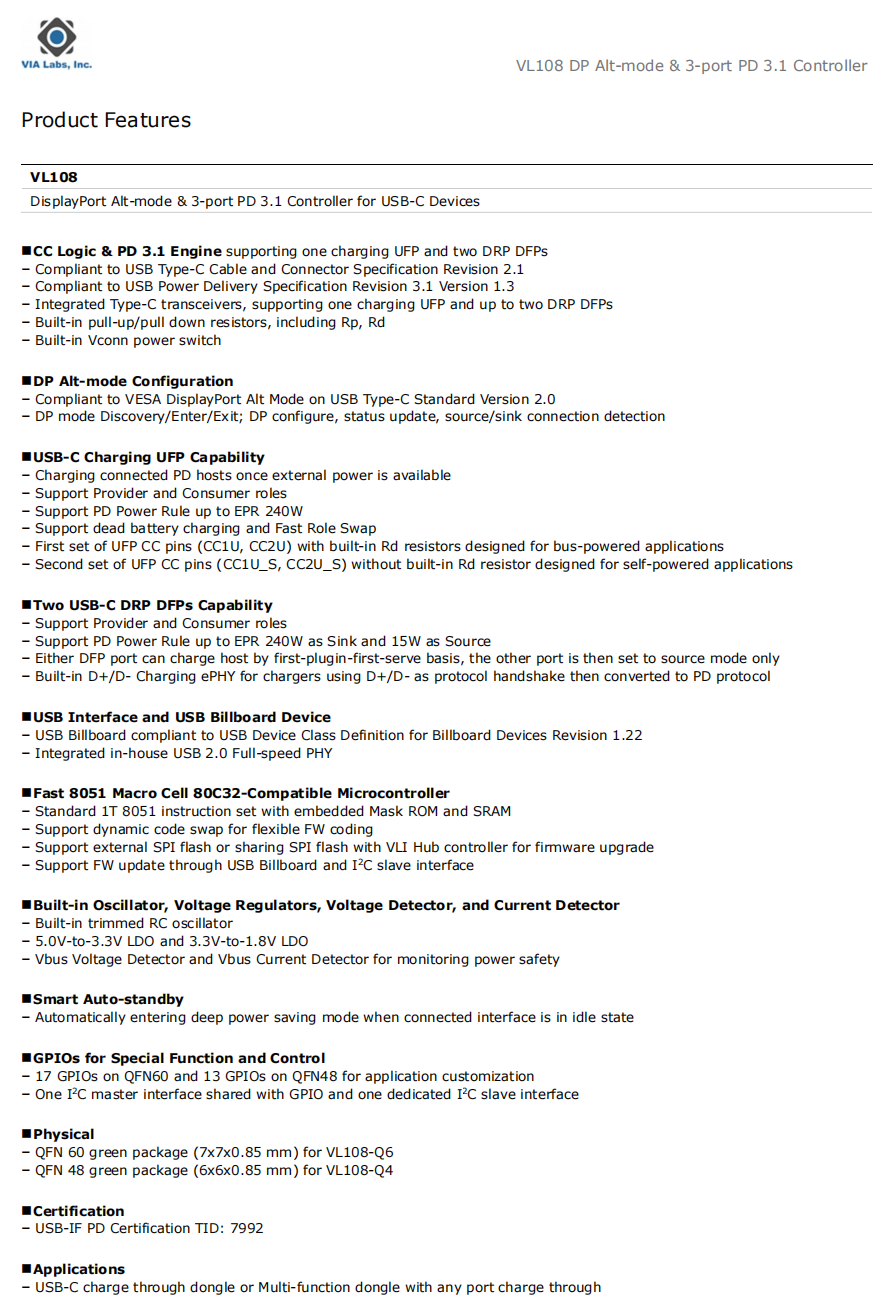
Both UFP and the two DFP ports support the latest PD3.1 EPR specification, capable of delivering power output of 48V 5A (240W). Additionally, the two DRP DFP ports integrate D+/D- Charging ePHY, supporting protocol handshaking using D+/D- and then transitioning to the PD protocol for power output via UFP.
The device policy manager within the VL108 negotiates power rules between DFP and UFP, enabling power charging. Furthermore, the VL108 features USB Billboard functionality to meet the "VESA DP Alt mode over USB Type-C" specification. It automatically enters a deep power-saving mode when the interface is idle, making it highly suitable for smartphone accessories.
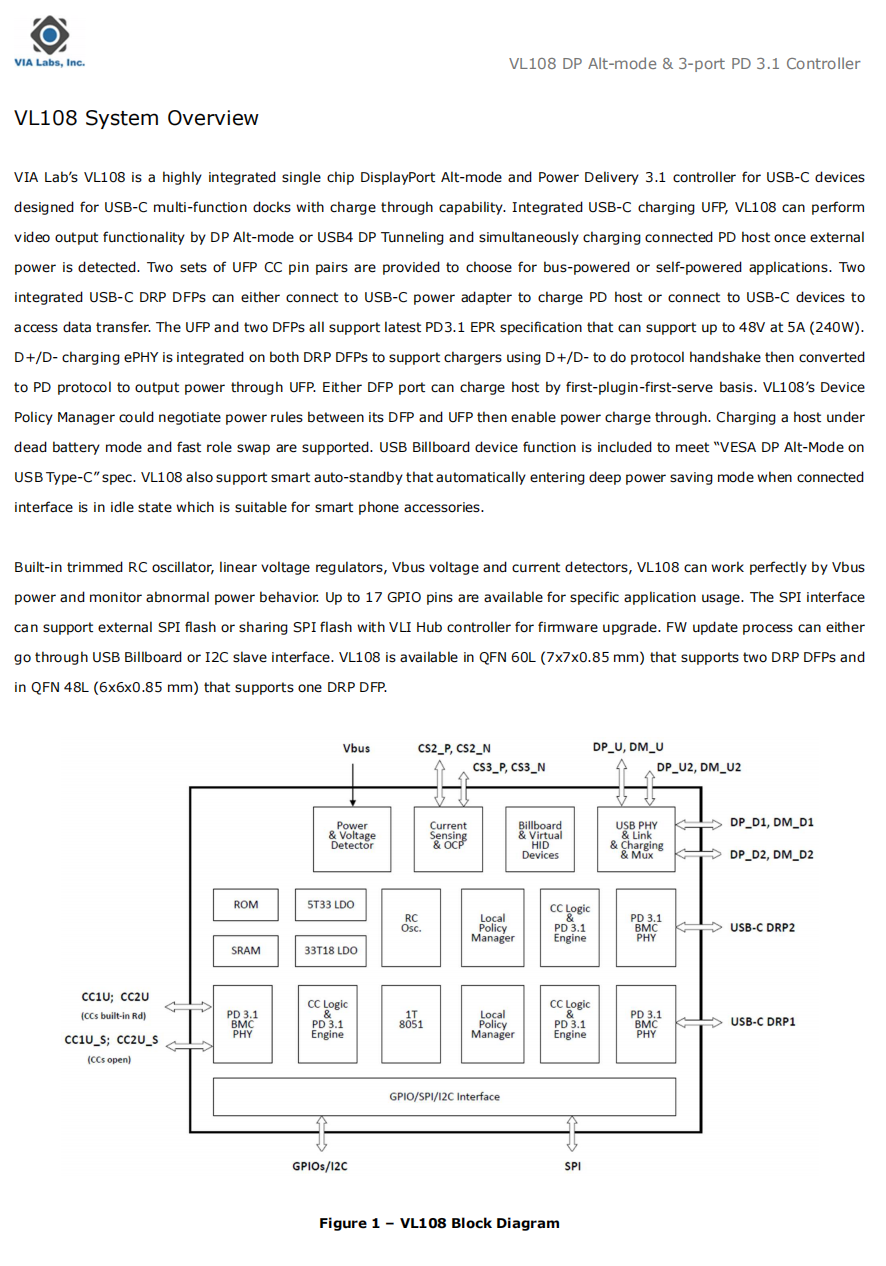
And the VL108 incorporates RC oscillators, linear voltage regulators, Vbus voltage, and current detectors to ensure stable operation via the Vbus power and monitor abnormal power behaviors. Additionally, it provides up to 17 GPIO pins for specific applications. It's available in two package options: QFN 60L (7x7x0.85 mm), supporting two DRP DFP ports, and QFN 48L (6x6x0.85 mm), supporting one DRP DFP port.
Leadtrend

Leadtrend possesses extensive experience in the field of power management. They specialize in the development of ACDC primary/secondary-side products, combining mixed-mode and integrated design technologies. Leadtrend is an IC design company focused on power management solutions for high-power ACDC applications.
Leadtrend LD6617
LD6617 is Leadtrend's latest highly integrated USB PD 3.1 controller, featuring an embedded 8-bit MCU with 32kbyte OTP and 256+384bytes SRAM, 11-bit ADC, parallel voltage regulator, voltage/current monitor, and controller, all in a simplified peripheral design.
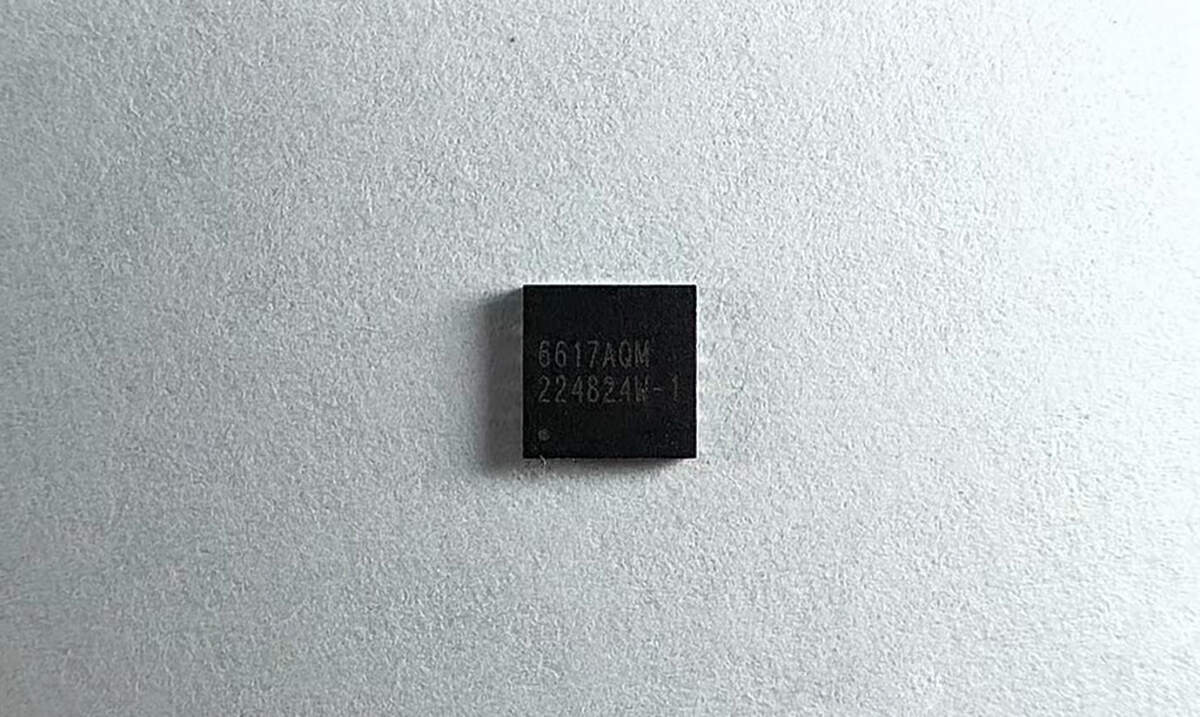
It supports a wide operating voltage range of 3.3V~45V, making it compatible with USB PD 3.1 SPR and EPR 28V/36V protocol specifications, as well as proprietary protocols like QC3.0, FCP, and AFC. This makes it ideal for use in various PD charging products, such as power adapters, wall chargers, and car chargers.
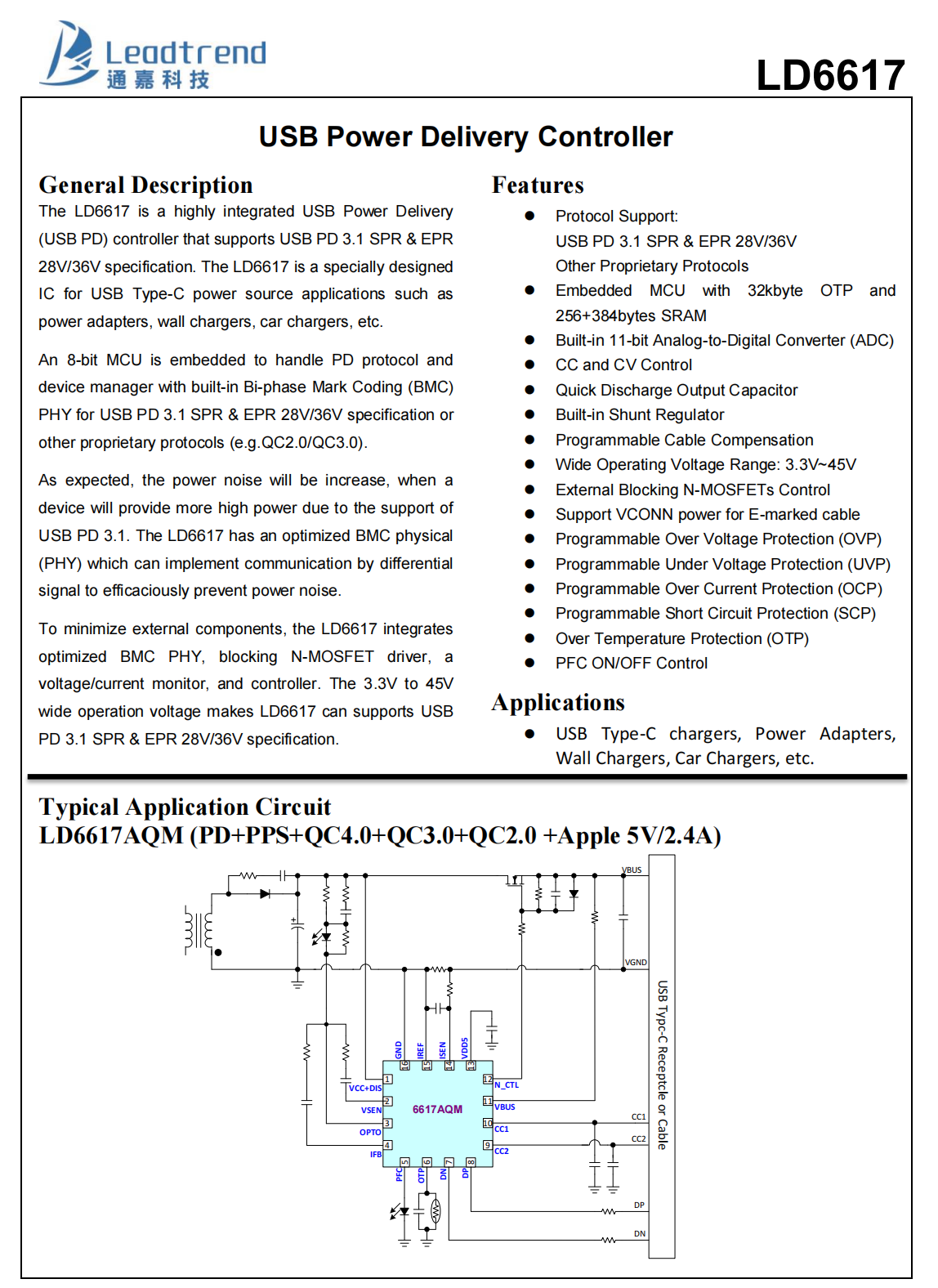
Moreover, it supports VCONN power for E-marker cables, CC/CV control, capacitor fast discharge, programmable cable compensation, PFC switch control, and other versatile features.
Convenient Power

Convenient Power is a rapidly growing company specializing in high-performance analog and mixed-signal integrated circuit chip design. Their product range includes wireless charging chips, fast charging protocol chips, cable chips, charge pumps, and related power management chips. These products find wide application in industries such as smartphones/wearables, personal computers, automotive electronics, and smart homes.
CPS8849A
Convenient Power's CPS8849A represents a new generation fast charging protocol IC. It offers multiple package options, allowing flexible selection based on diverse application scenarios. Supporting all mainstream fast charging protocols including PD3.1, it integrates MTP and enables software upgrades via Type-C. The output voltage ranges from 3V to 22V, integrating high-precision constant voltage (CV) and constant current (CC) loops to meet PPS, UFCS protocol voltage, and current accuracy specifications.
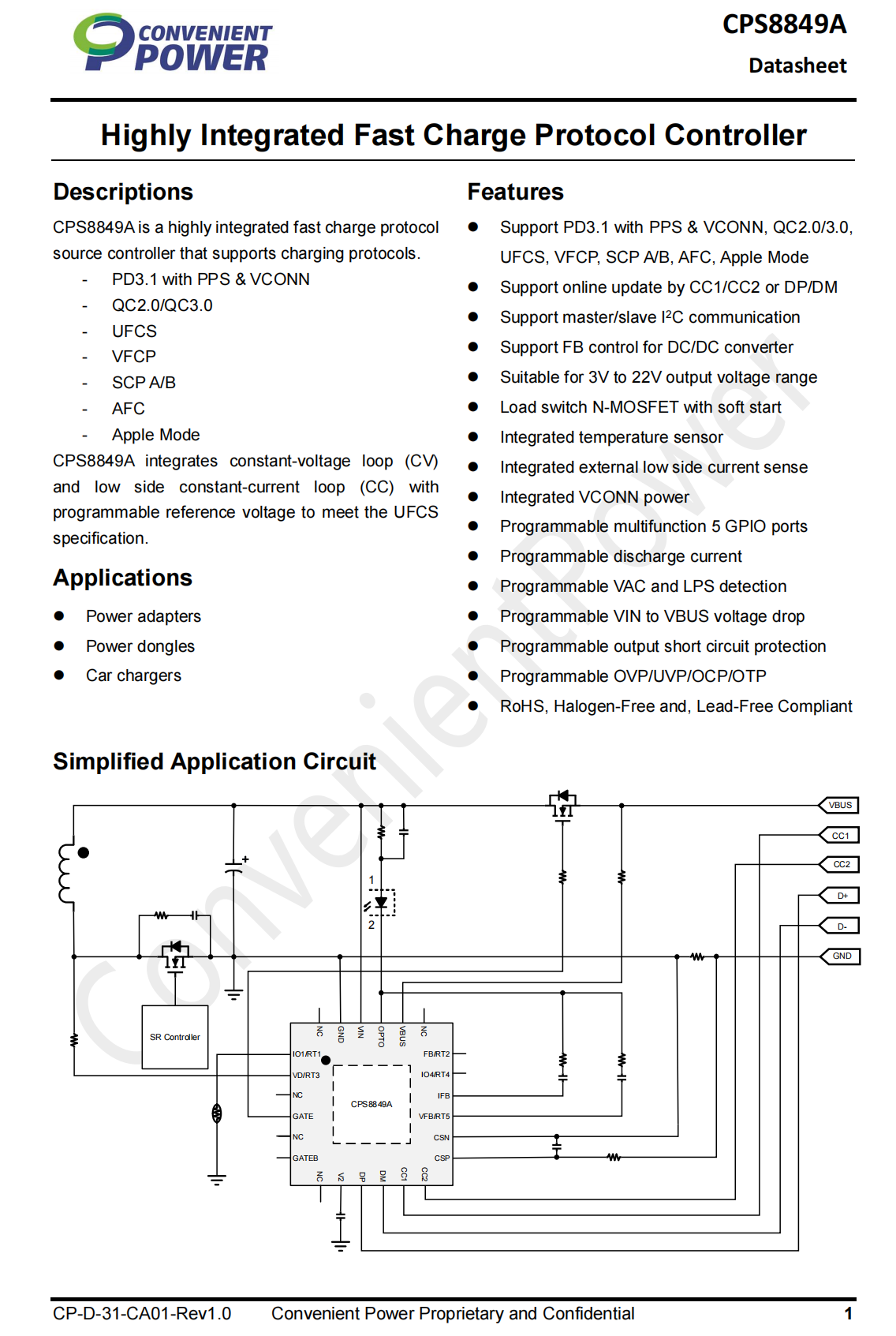
It can be utilized in wall plug AC/DC and DC-DC automotive power supplies, as well as single and multiple port expansion products.
CPS8849B
CPS8849B is a highly integrated fast charging protocol controller supporting PD3.1, QC2.0/QC3.0, SCP A/B, AFC, Apple, and other mainstream fast charging protocols. It integrates a constant voltage loop (CV) and low-side constant current loop (CC) with programmable reference voltage to meet PD3.1 specifications.
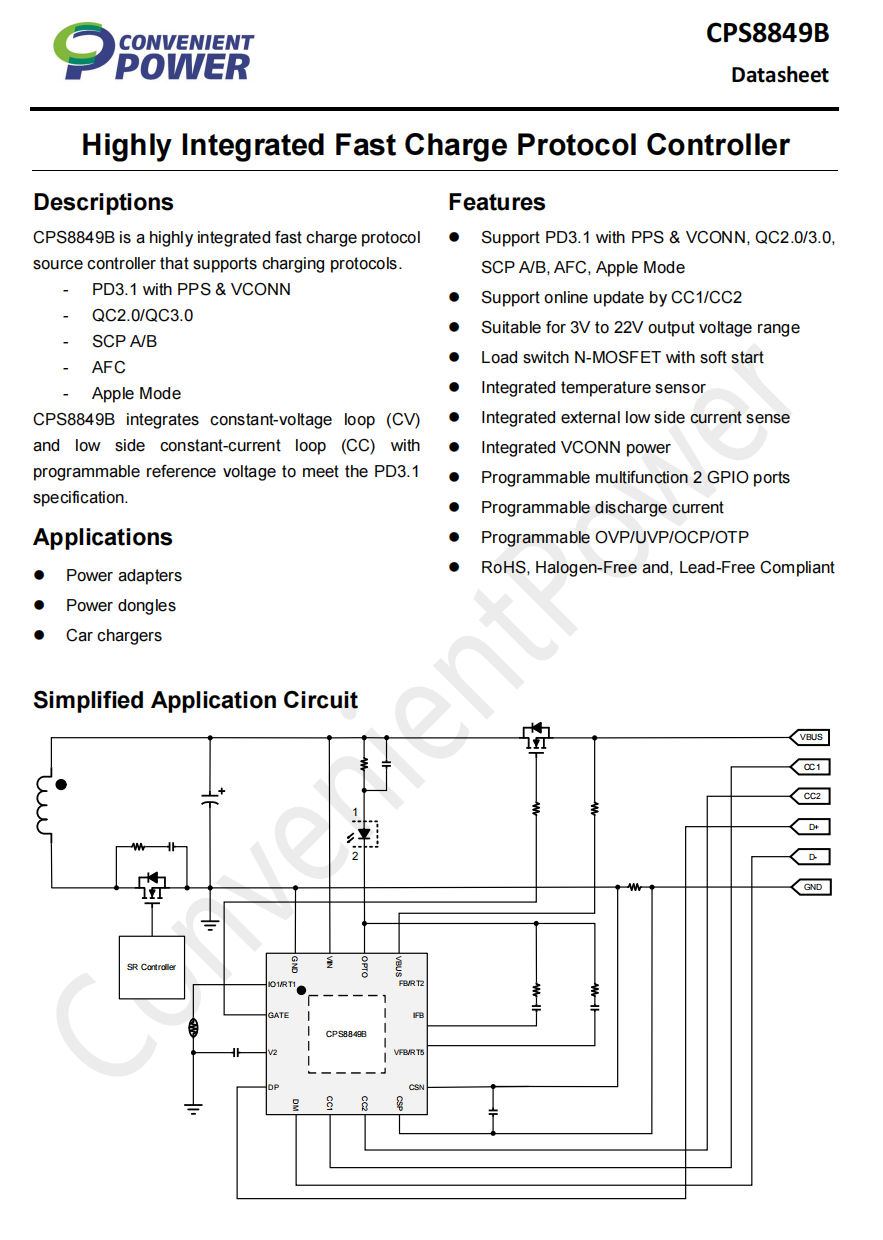
Here are the detailed specifications for CPS8849B.
CPS8860H
CPS8860H, the latest release from Convenient Power, is a highly integrated fast charging protocol controller supporting PD3.1, QC2.0/QC3.0, UFCS, SCP A/B, AFC, Apple, and BC1.2 CDP, among other mainstream fast charging protocols.
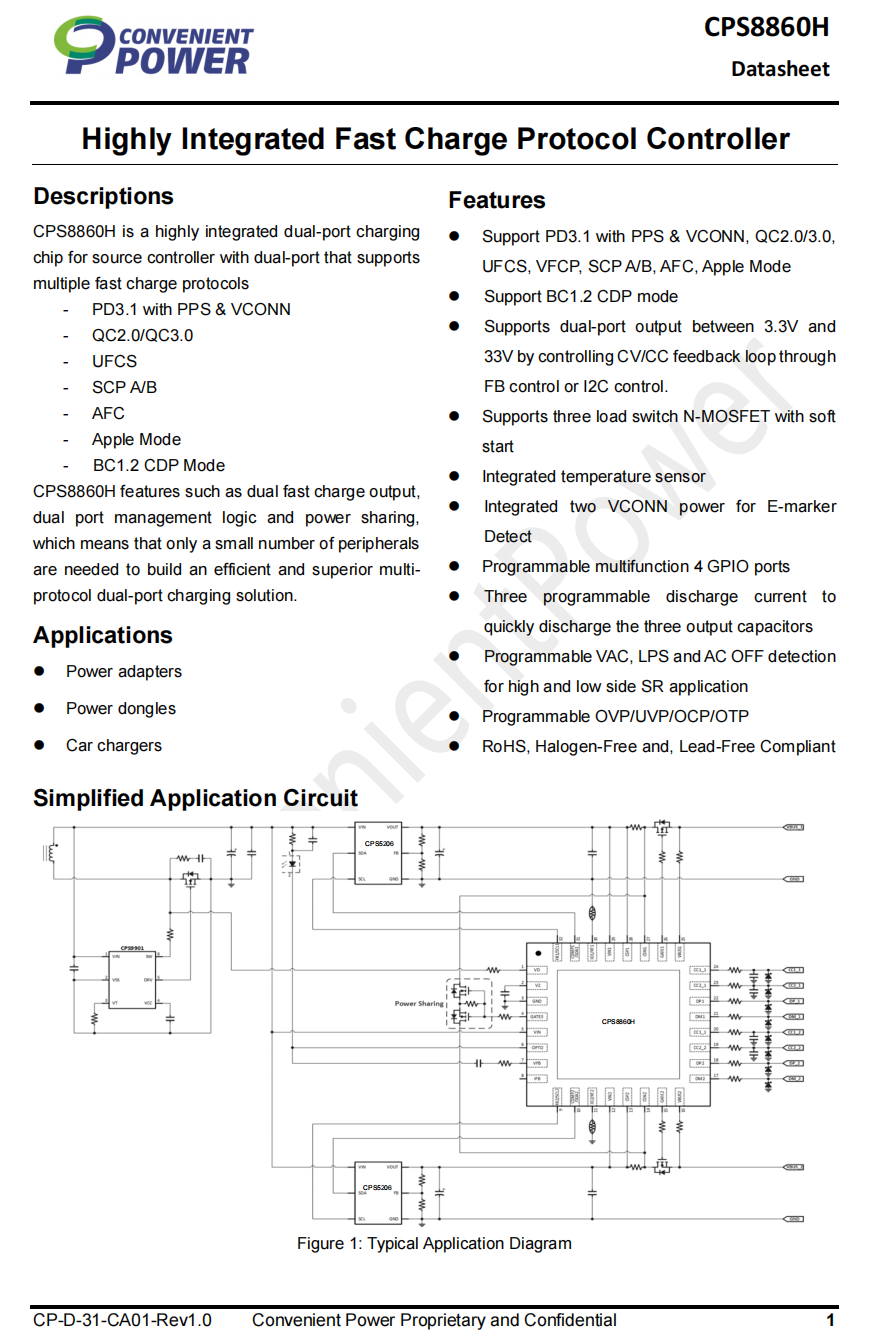
It features dual-port fast charging outputs, dual-port management logic, power sharing, requiring minimal peripheral devices to create an efficient and superior multi-protocol dual-port charging solution.
Hynetek

Hynetek is a company specialized in smart energy control technology, primarily focusing on intelligent fast charging and digital energy sectors, providing high-performance mixed-signal chip products.
HUSB251
Hynetek's HUSB251 is a PD protocol chip that supports USB-C DRP. The chip supports PPS PDO and EPR PDO, and all PDOs fully comply with USB PD 3.1 Rev.1.8 specifications, including support for 28V EPR FPDO and EPR AVS. It also supports QC2.0, QC3.0, AFC, FCP, and UFCS fast charging protocols, making it highly compatible. The chip has an integrated NMOS driver for power control using NMOS.
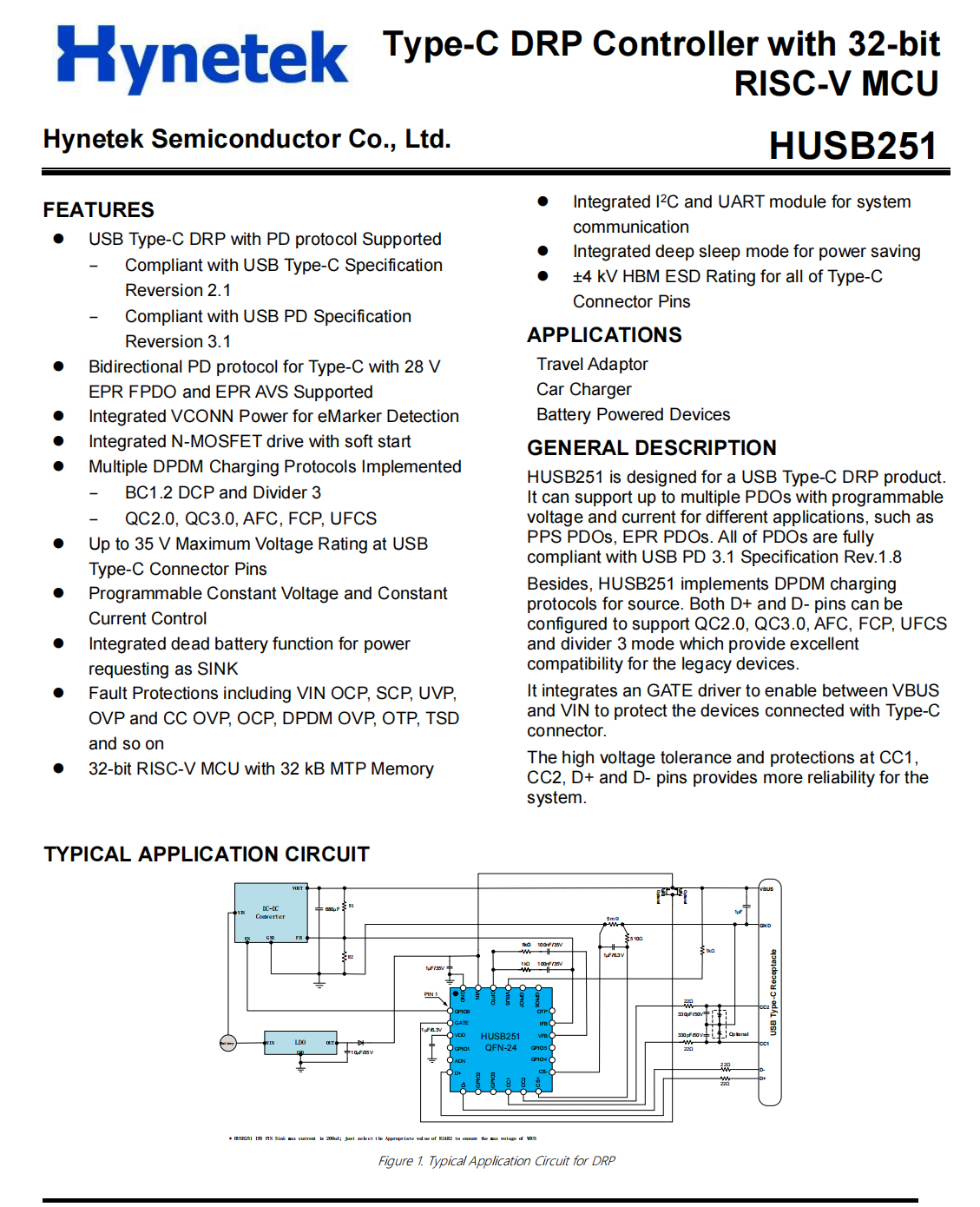
The chip also integrates Vconn power for E-marker chip detection, supports programmable constant voltage and constant current control, and integrates multiple protection measures and overheat protection. It includes a 32-bit RISC-V MCU and 32KB MTP storage, as well as I2C and UART interfaces.
HUSB362
Hynetek's HUSB362 is a high-performance PD protocol chip that supports PD3.1 EPR and integrates an MCU. It supports multiple PDOs with programmable voltage and current, such as PPS PDO and EPR PDO, all fully compliant with USB PD 3.1 V1.7 specifications. It supports EPR mode with 140W (28V5A), PPS supports from 18W to 100W, and AVS supports from 100W to 140W. It has passed USB-IF Association's PD3.1 compliance test, with a TID of 9329.
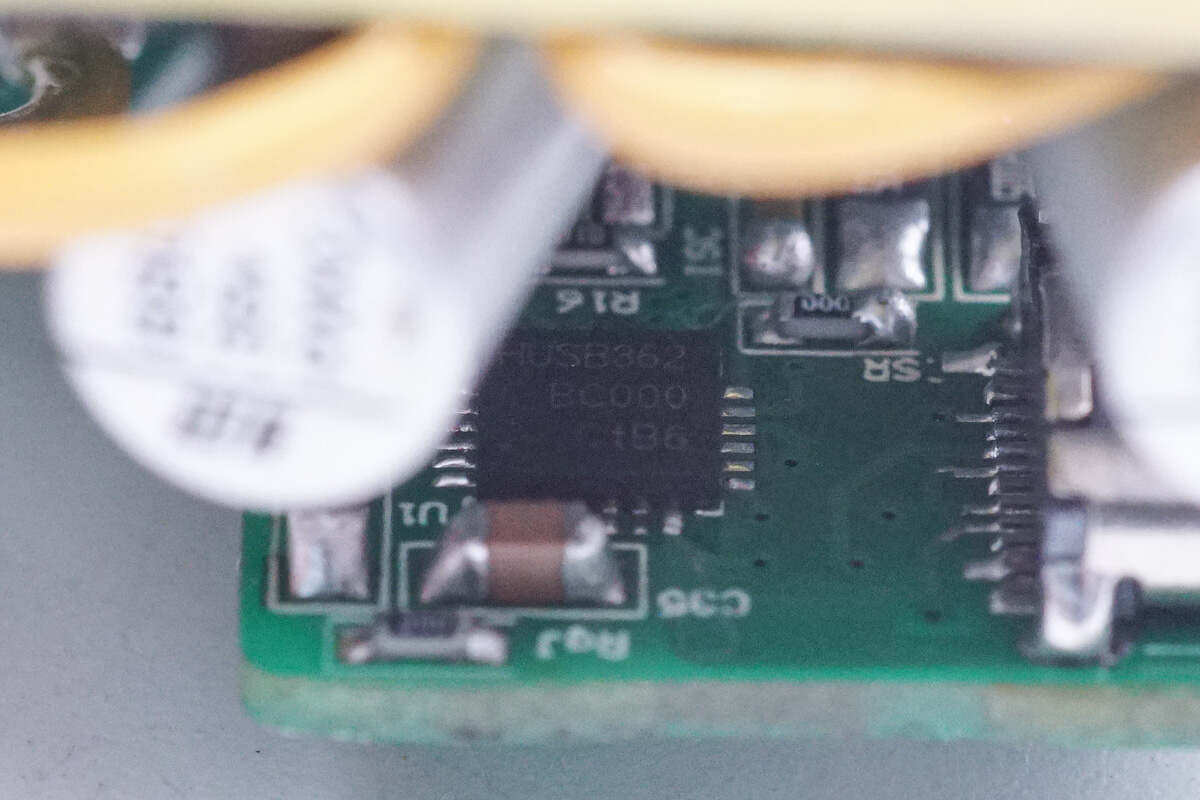
This chip also implements programmable DPDM PHY, where D+ and D- pins can be configured to support QC2.0, QC3.0, AFC, FCP, and Divider 3 modes, ensuring excellent compatibility with traditional devices.
It integrates N-MOS driver and is fully protected for LPS (limited power supply).
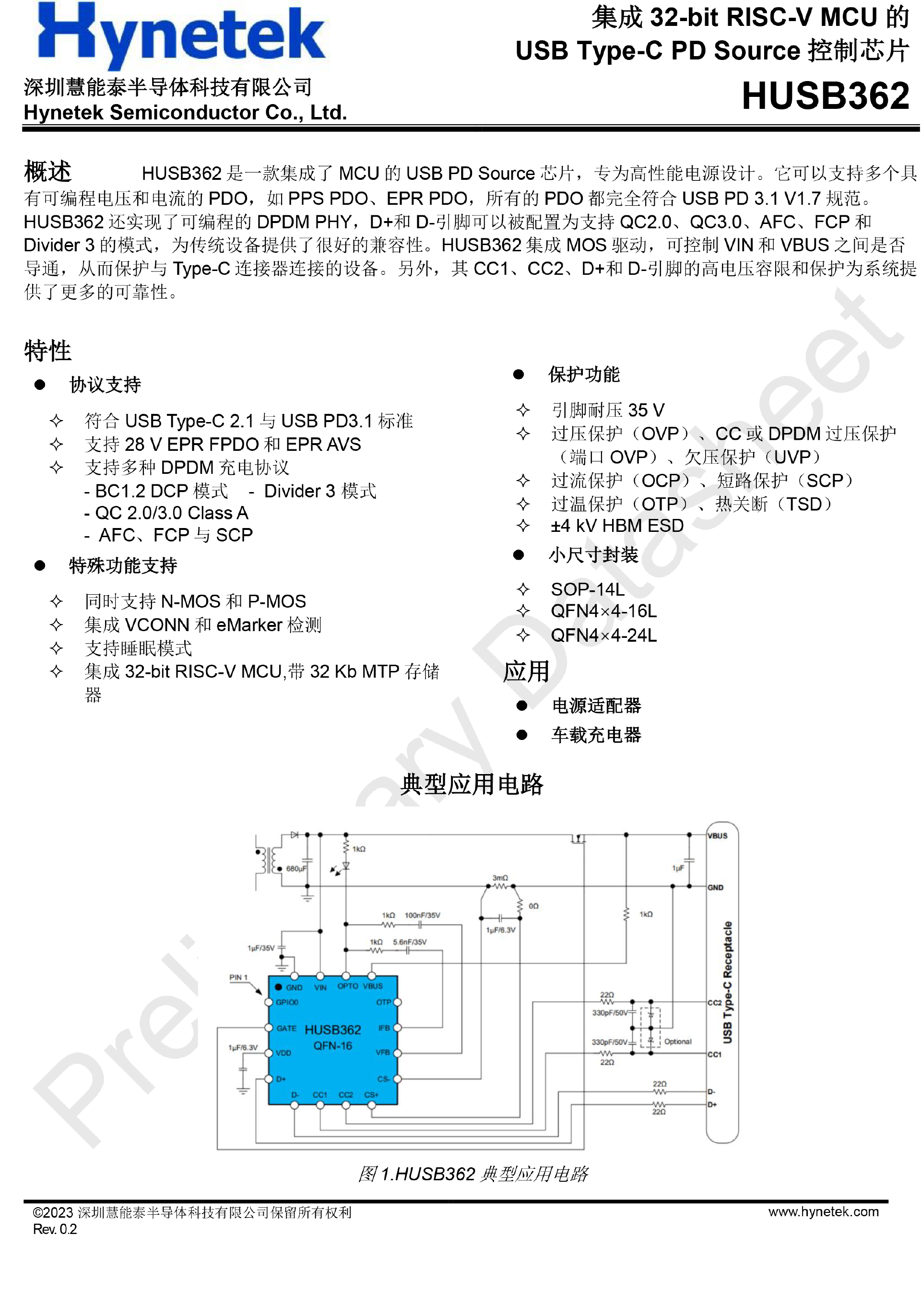
Furthermore, it features a dual-loop design, allowing users to implement application design with minimal peripheral components, thereby enhancing space utilization and reducing design complexity and BOM costs.
HUSB363
HUSB363 is designed specifically for USB Type-C PD products. It supports multiple programmable PDOs for various applications, including PPS (Programmable Power Supply). All PDOs fully comply with USB PD 3.1 Specification Rev.1.8. Additionally, its D+ and D- pins can be configured to support QC2.0, QC3.0, AFC, FCP, and Divider-3 modes, ensuring outstanding compatibility for traditional devices.
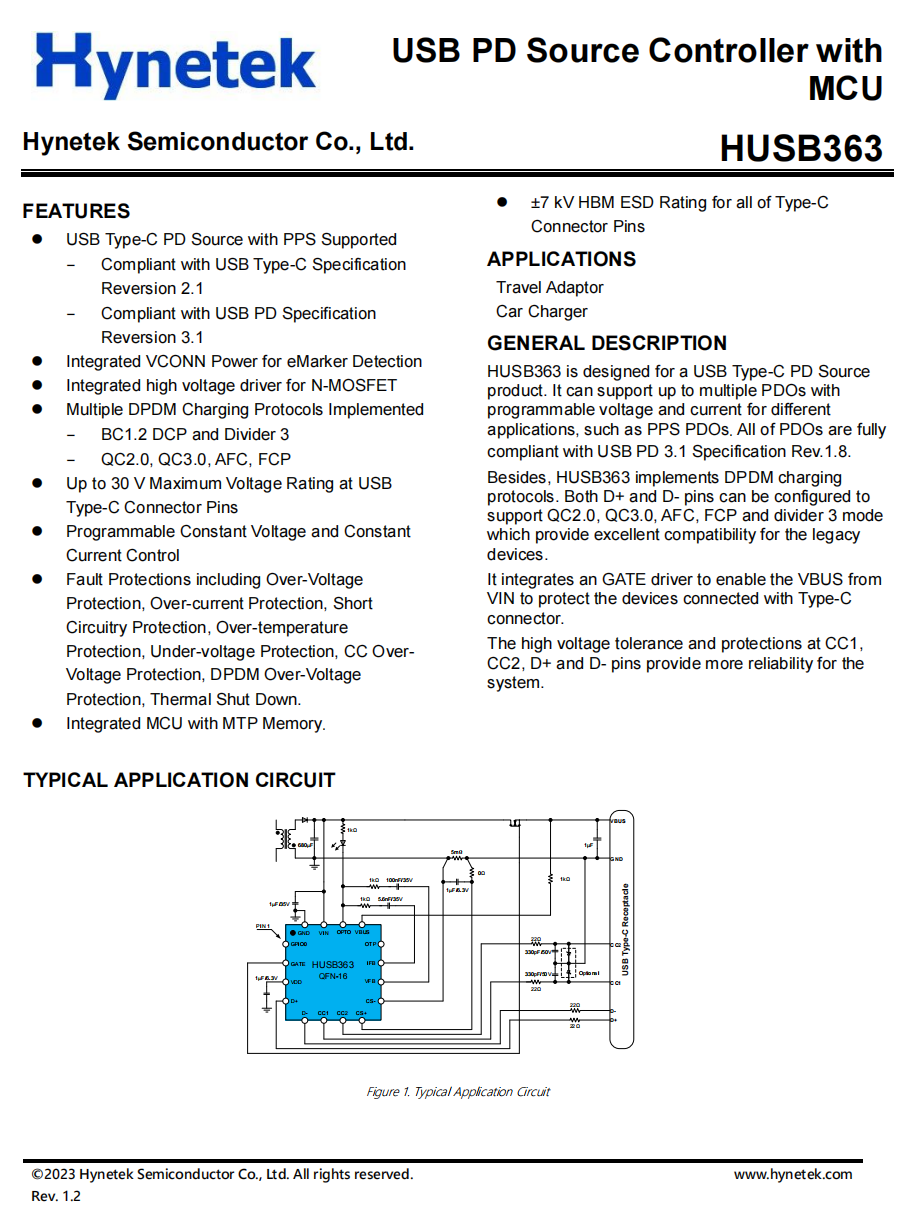
Moreover, it integrates a GATE driver to enable voltage from VIN to VBUS, providing protection for devices connected to the Type-C connector. The high voltage tolerance and protection features on CC1, CC2, D+, and D- pins offer enhanced system reliability.
Jadard

Jadard's product range includes display driver chips for mobile smart terminals, camera driver chips, fast charging protocol chips, and more. These products are extensively utilized in areas such as mobile phones, tablets/smart speakers, wearable devices, fast charging/power banks, and others.
JD6628
Jadard JD6628 is a highly integrated protocol chip that supports PD3.1 and PPS output, with support for 3.3-28V output voltage. It covers various protocols, including UFCS, Huawei SCP, FCP, Qualcomm QC2.0/3.0/3+. It also integrates dual amplifiers, separately used for constant voltage and constant current control.
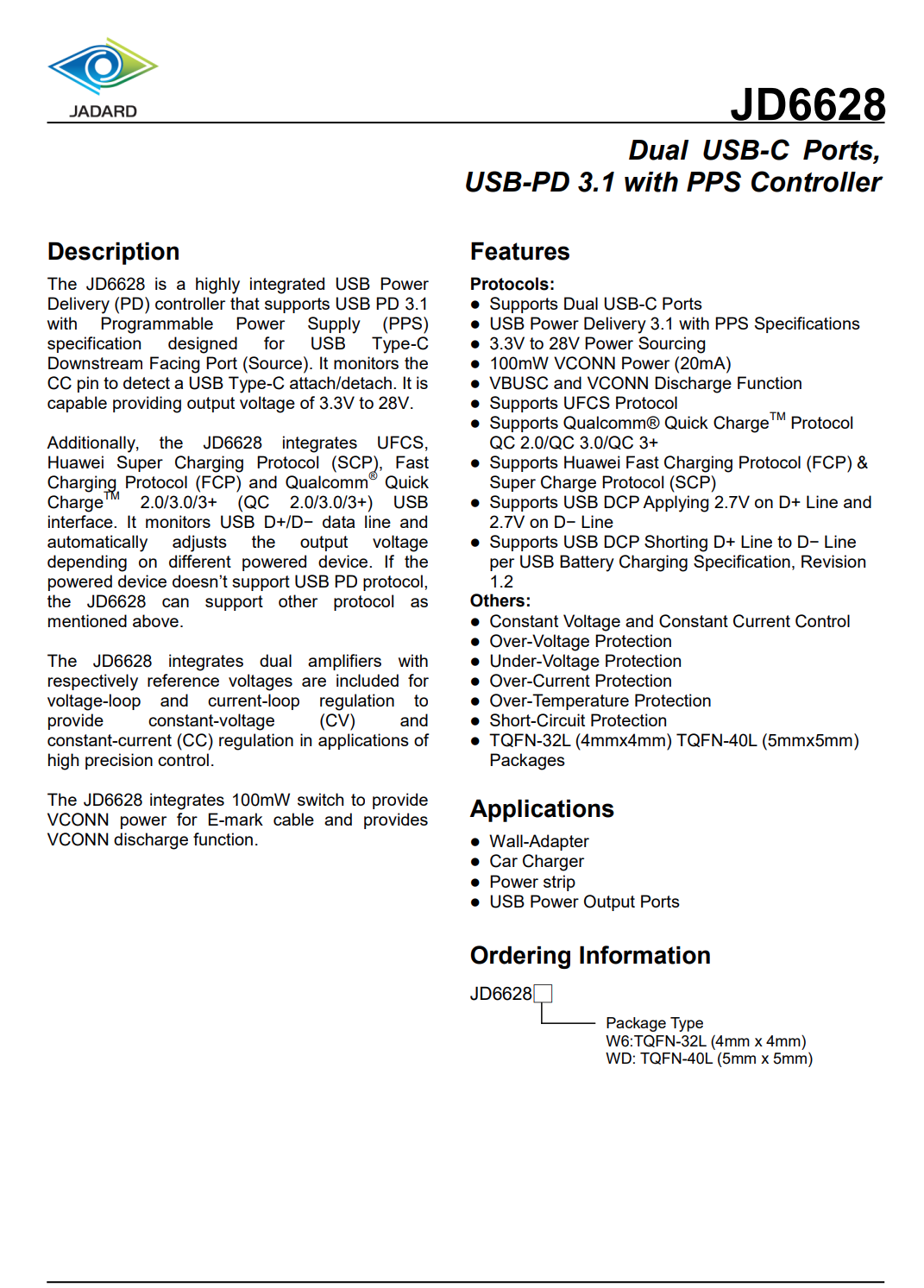
It also features VBUS discharge and VCONN discharge, and incorporates protections like overvoltage protection, undervoltage protection, overcurrent protection, short circuit protection, and overheat protection, making it suitable for fast charging chargers, car chargers, and other applications. It comes in TQFN 4x4-32L and TQFN 5x5-40L packages.
Legendary

Legendary is a company specialized in USB-C port control chips. Their core team boasts over 20 years of chip development experience, and their products are utilized by well-known brands such as Xiaomi, Lenovo, Philips, ViewSonic, MSI, and others.
LDR6020
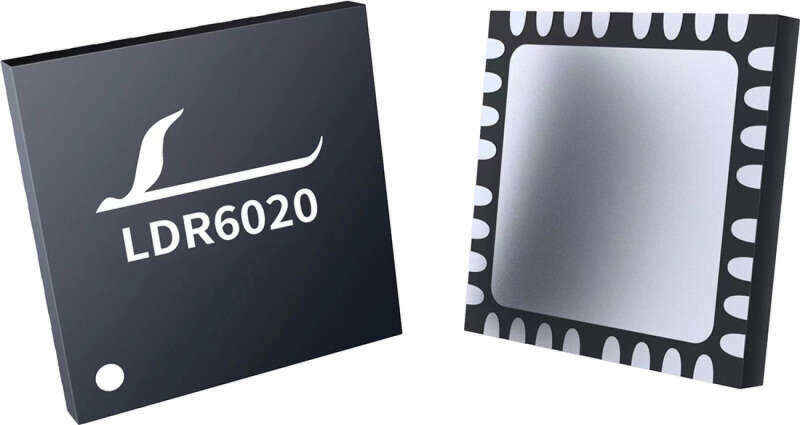
The LDR6020 is a 16-bit RISC MCU equipped with three sets of six-channel DRP USB-C and PD communication protocol modules, as well as a USB2.0 Device module. With USB PD3.1 communication capability, it can handle 262-byte non-collapsed PD3.1 long data packet communications. The chip supports online firmware upgrades through CC, UART, I2C, and USB2.0 modes.
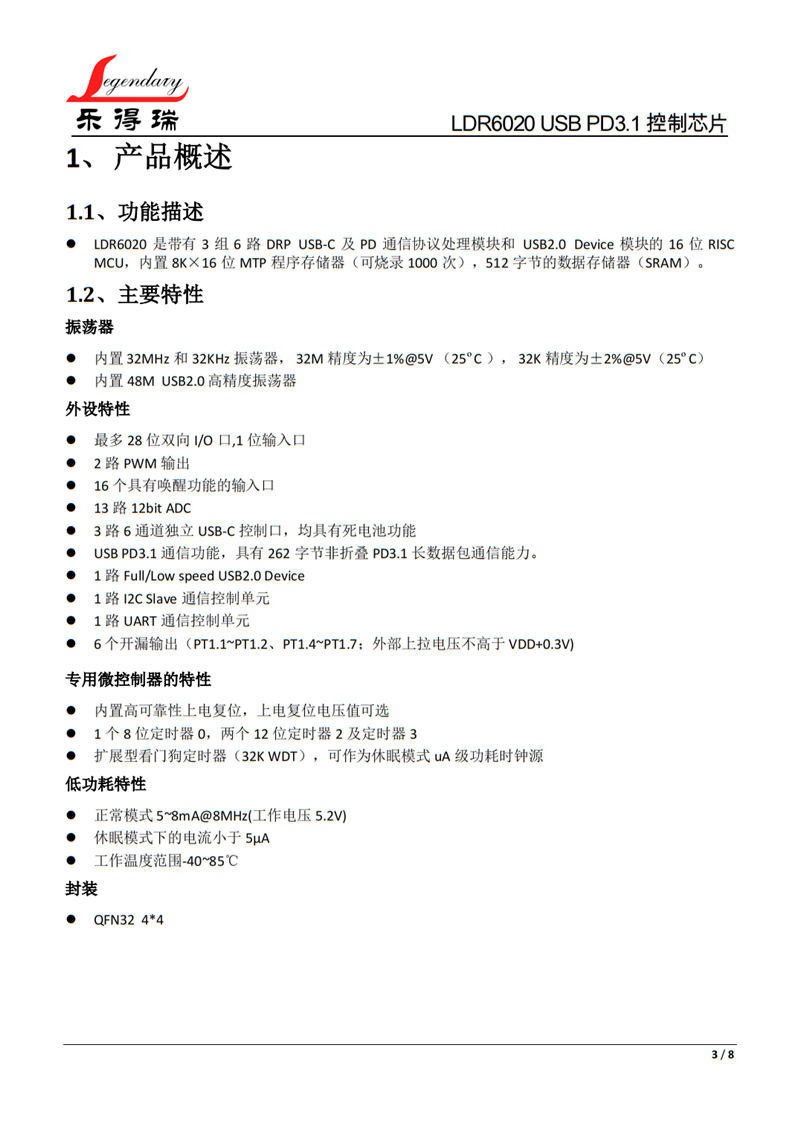
Furthermore, it boasts 13 ADC channels, 28 dual-directional I/O ports, 1 input port, and 2 PWM channels, facilitating customized designs. In the future, an embedded cloud IDE development system will also be introduced. The chip is packaged in a QFN-32 4x4 format.
This controller finds extensive applications, such as in USB-C multifunctional adapters, USB-C monitors, and USB-C power banks. It includes an embedded I2C Slave and a UART communication control unit for intercommunication with other master control chips.
LDR6020P
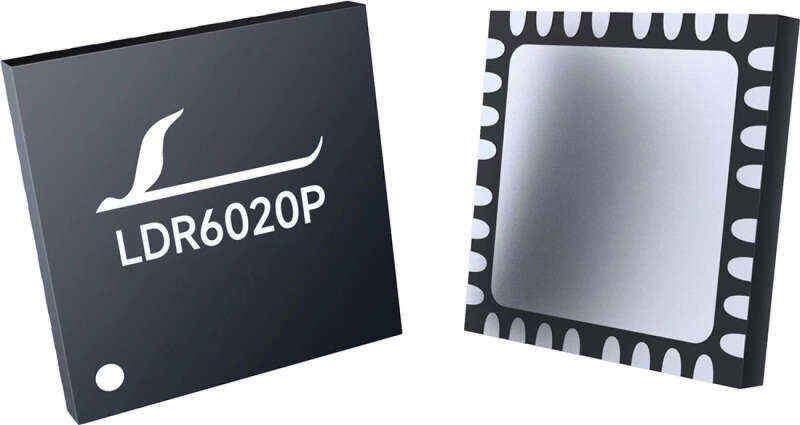
The LDR6020P is a power management Unit (PMU) based on SIP technology, integrating three sets of six-channel DRP USB-C and PD communication protocol modules. It features two 20V VBUS MOSFETs and a 16-bit RISC MCU, with a resistance range of 15 milliohms (VGS>10V) to 22 milliohms (VGS>5V).
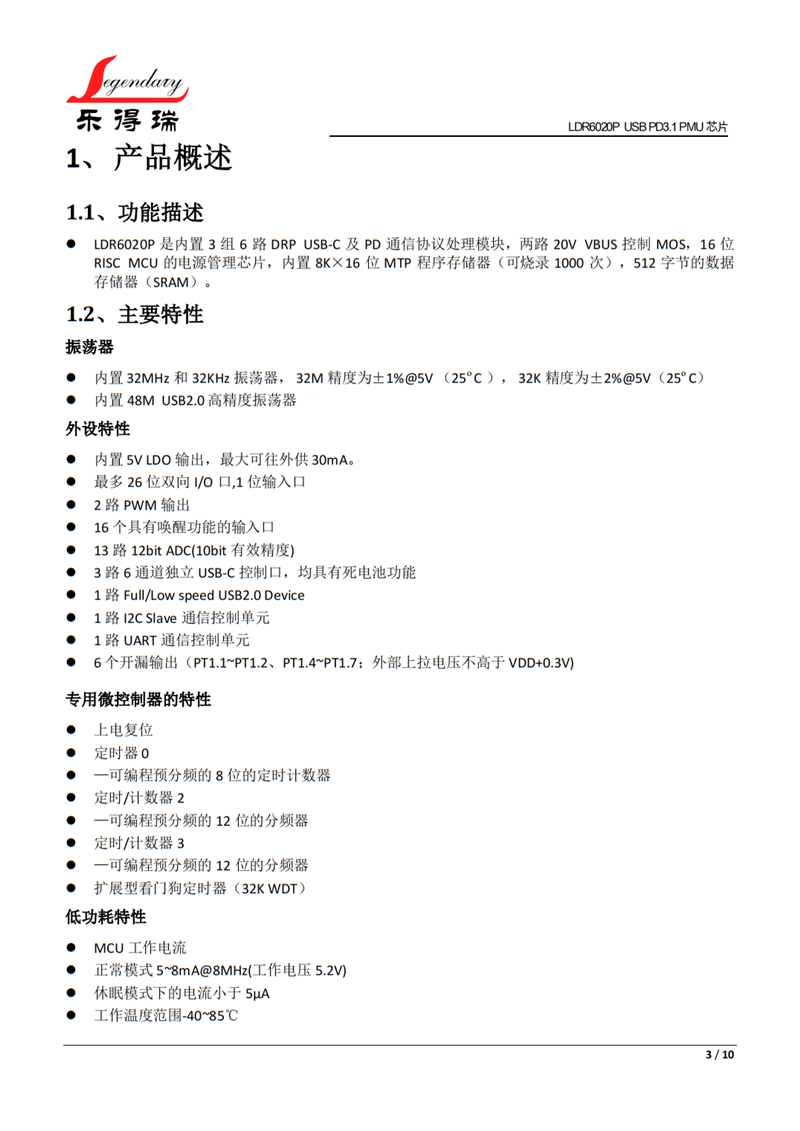
LDR6020P features a built-in 5V LDO with a withstand voltage of up to 24V and can output a current of over 150mA, suitable for powering other external devices. It includes two sets of Type-C port VBUS voltage paths. It's essential to note that due to the maximum withstand voltage of the internal LDO being 24V, users requiring support for USB PD3.1's 28V and above voltages can utilize LDR6020 in conjunction with an external power supply.
Summary of ChargerLAB
As electronic devices demand more power, having a unified charging solution that can provide higher power is becoming more important. USB PD3.1 not only helps simplify users' charging needs but also drives the development of portable devices, especially for high-performance devices that require a substantial amount of power. For instance, in the case of high-end laptops, USB PD3.1 support reduces reliance on traditional AC adapters, enabling a single charger to power them all, significantly enhancing portability.
Following the release of USB PD3.1 fast charging technology, more and more manufacturers are venturing into related products. Each offering distinctive features covering various applications such as LLC synchronous rectification, synchronous buck, protocol, E-marker, providing users with a wider range of choices. Consumers can easily find suitable USB PD3.1 fast charging solutions based on their needs and preferences. Furthermore, this healthy market competition is driving continuous technological advancements and innovations, delivering users a more efficient and convenient charging experience.
Related Articles:
1. 30 PD3.1 Protocol Chips and Their 11 Manufacturers: A ChargerLAB Analysis
2. Innovating Power: Exploring Six 140W PD3.1 Power Bank PMICs
3. PD3.1 Enabled | iSmartWare Launched Multi Protocol Buck-Boost Chip SW6301V


